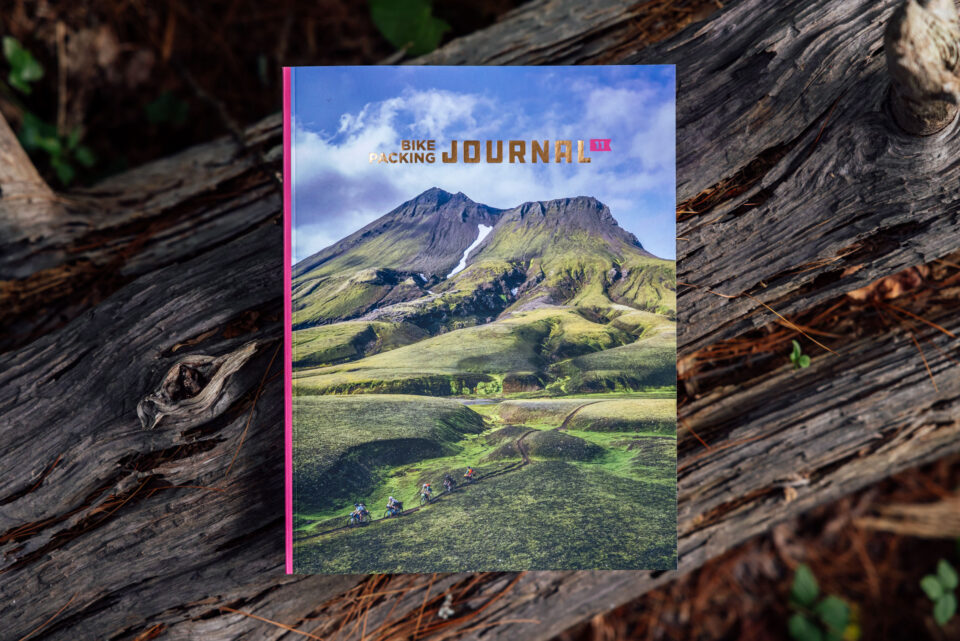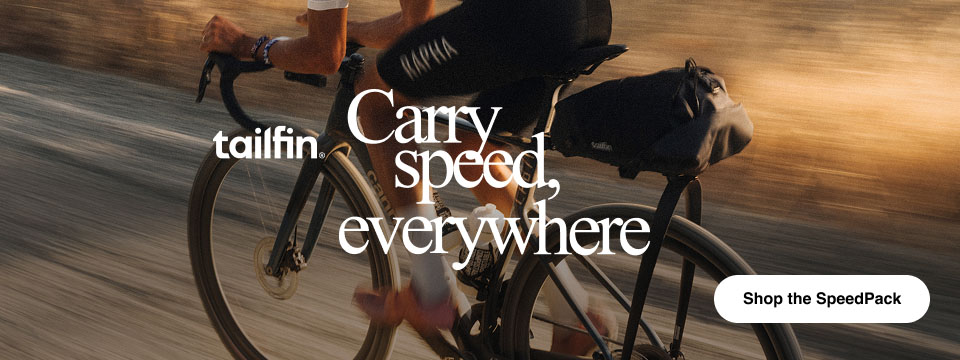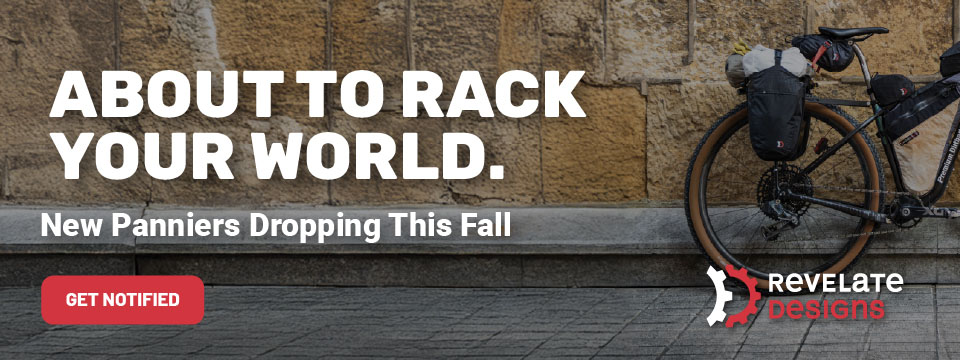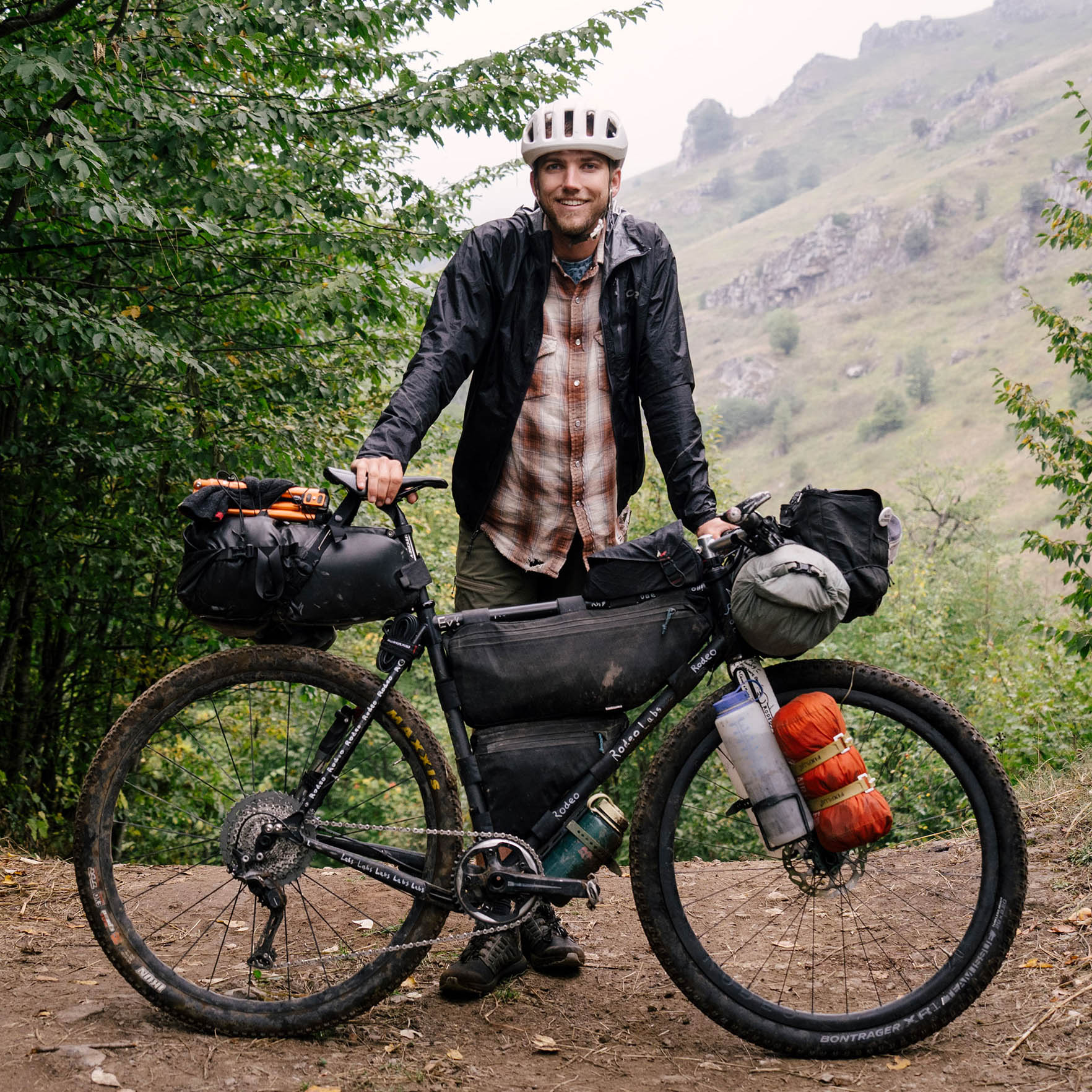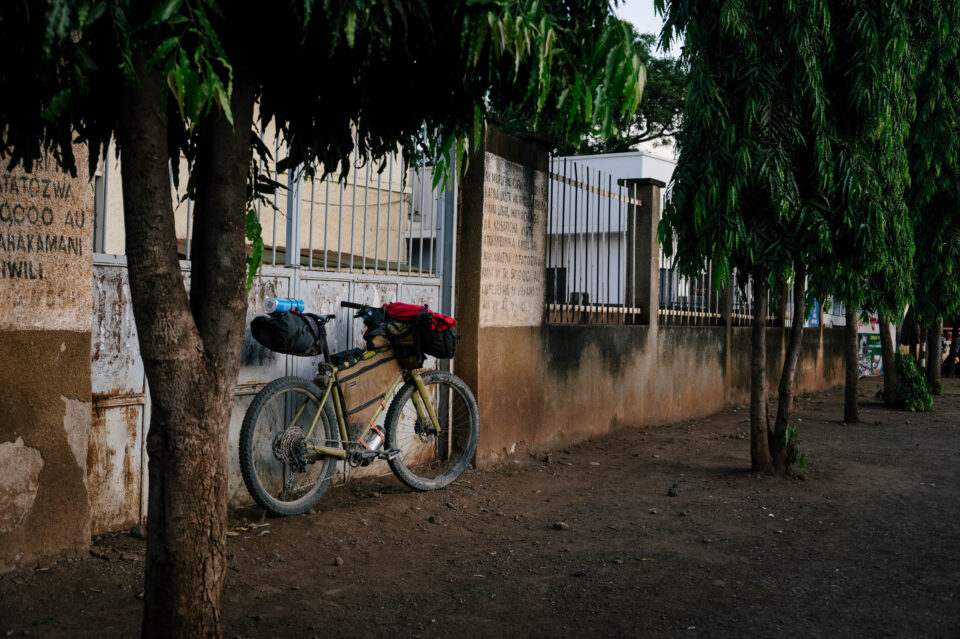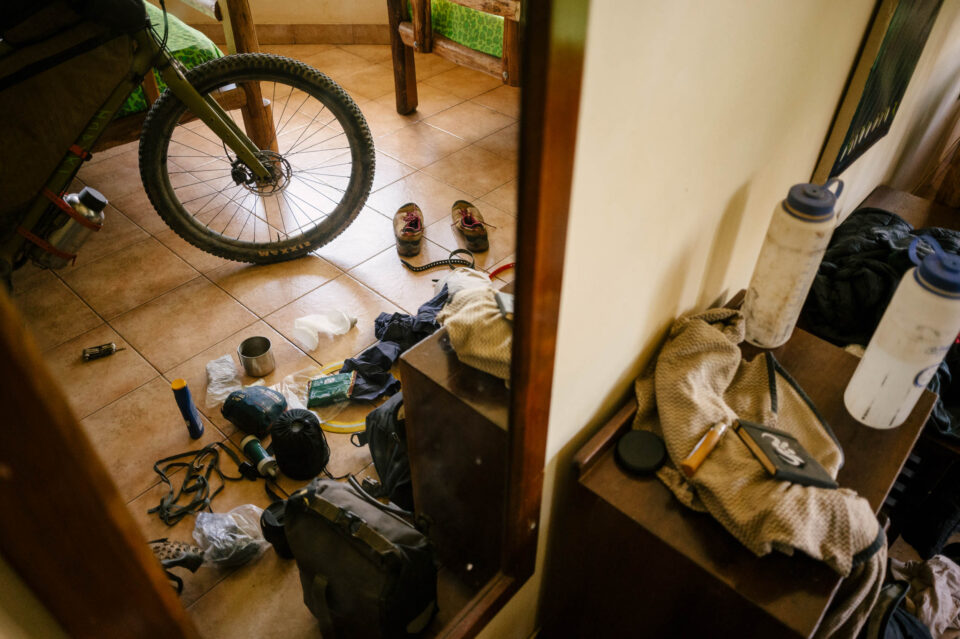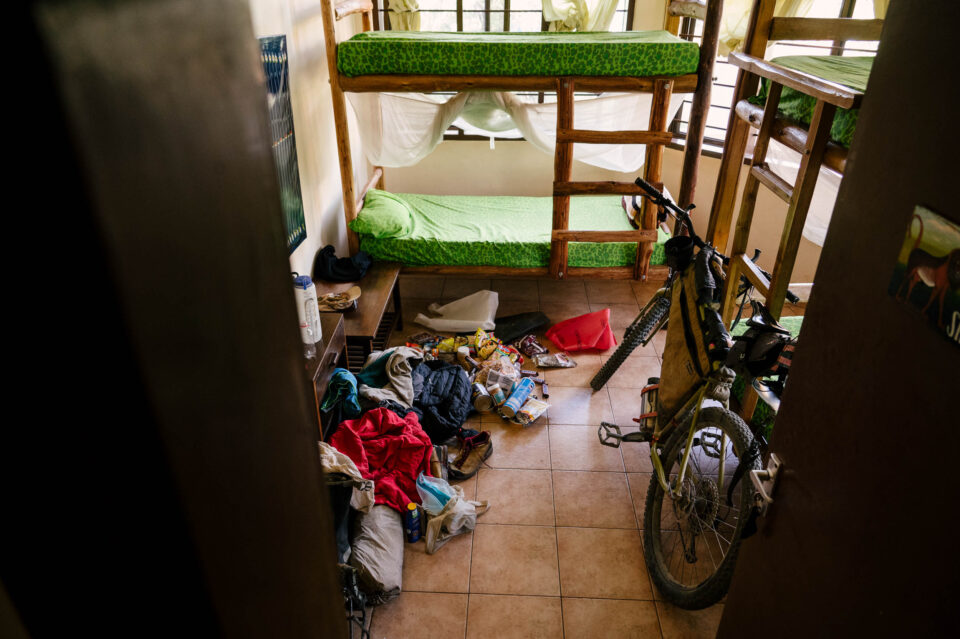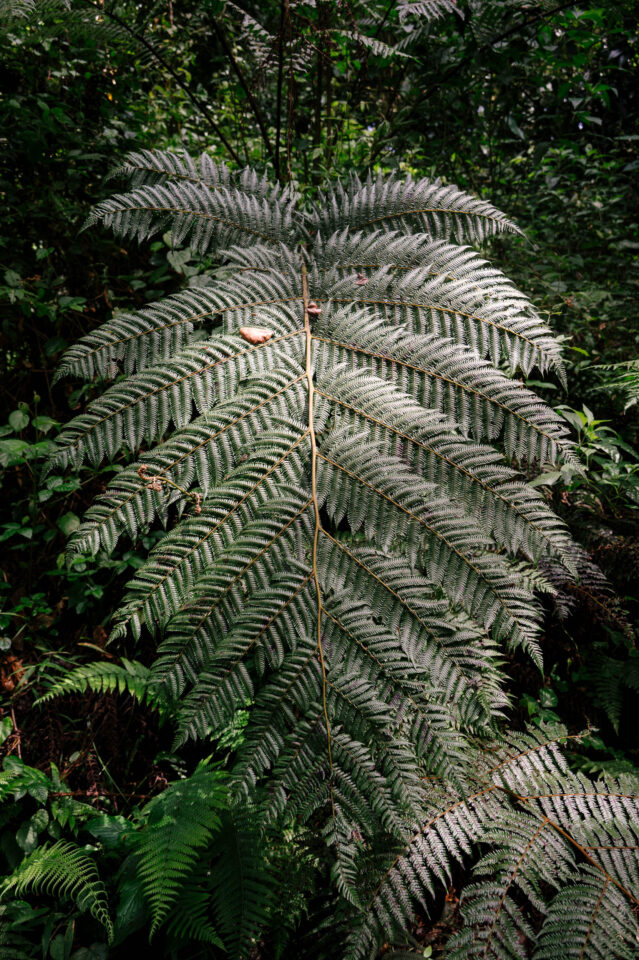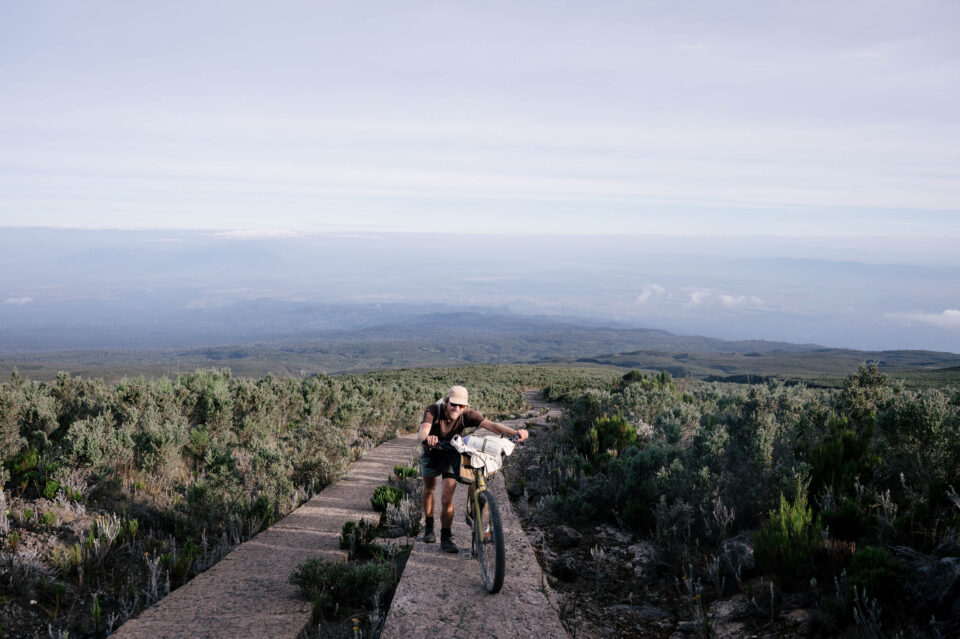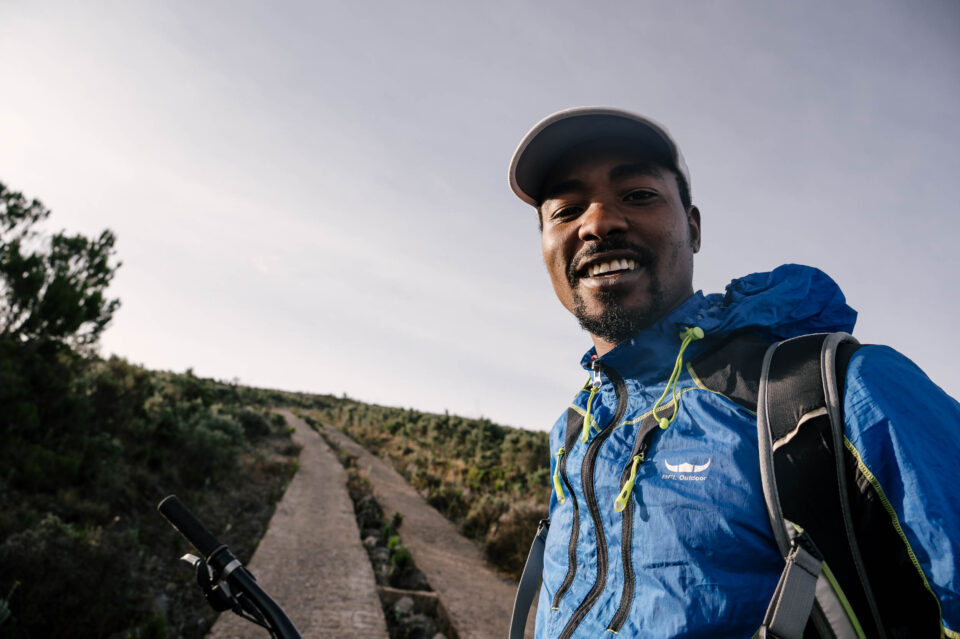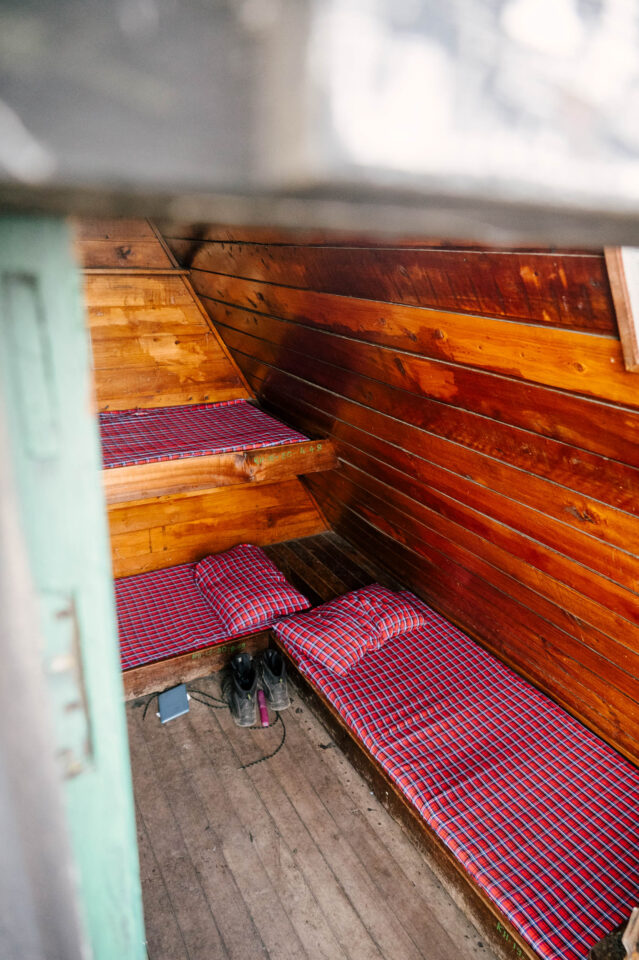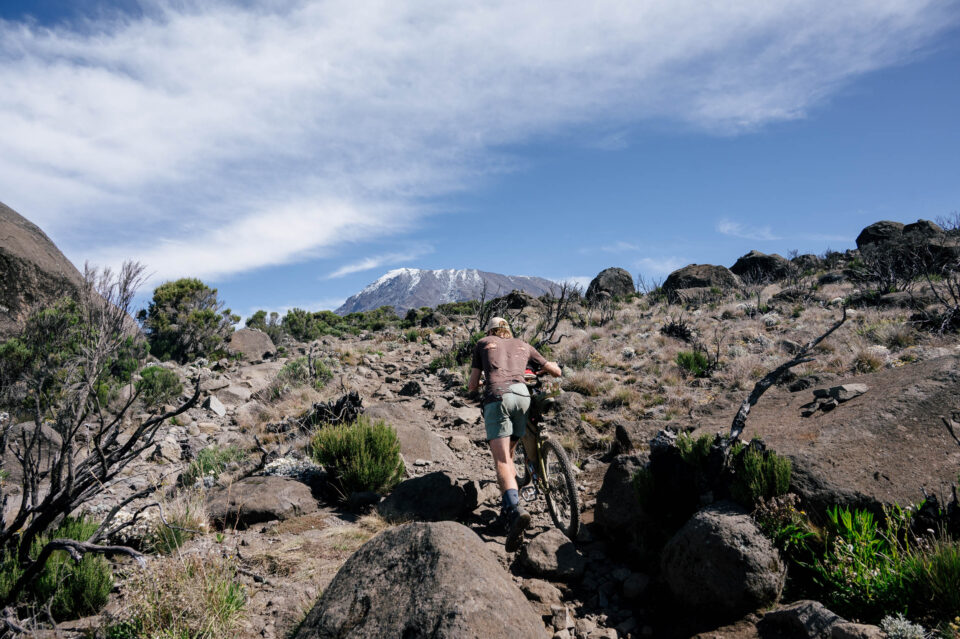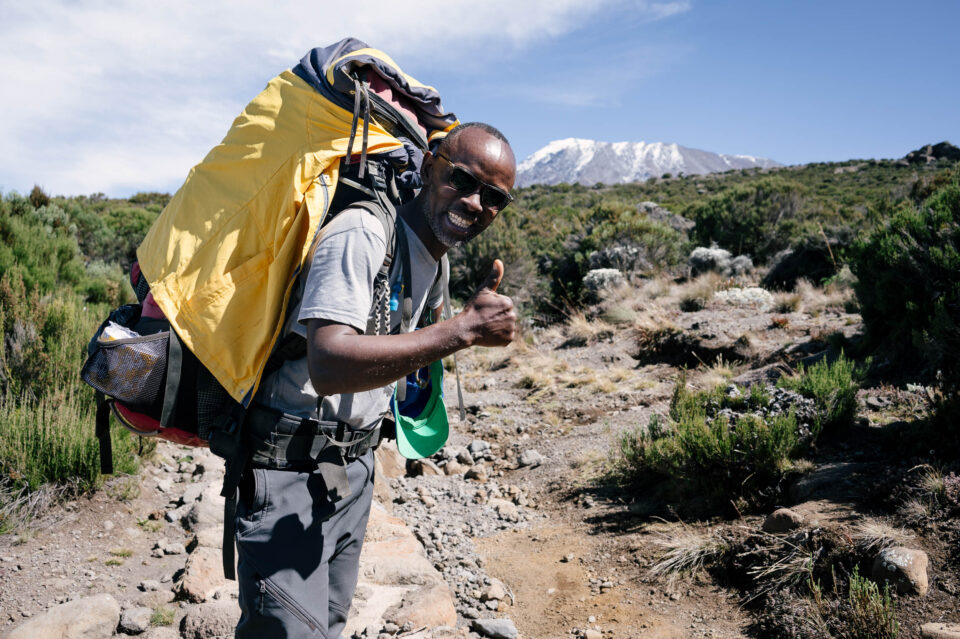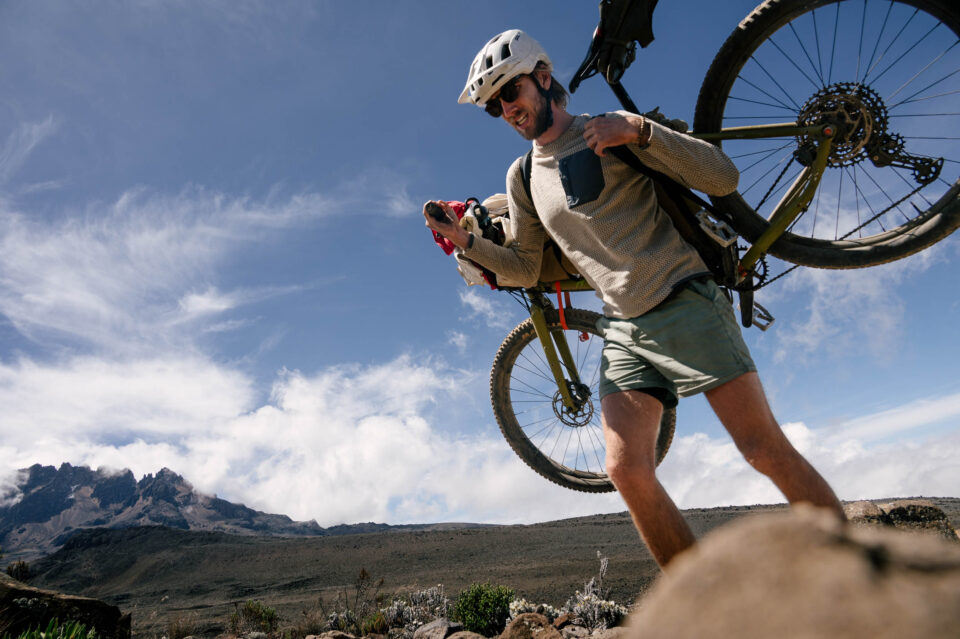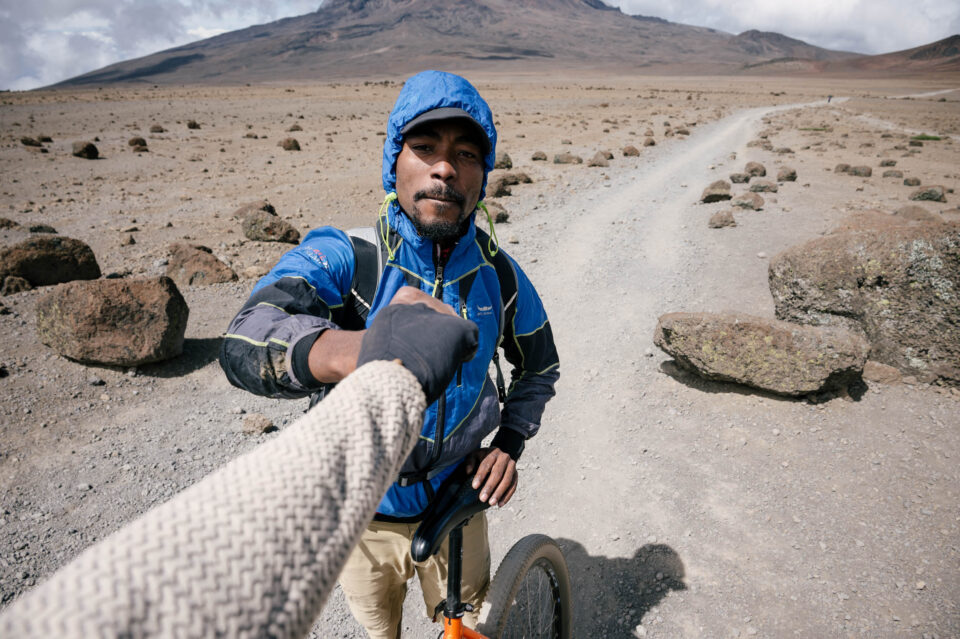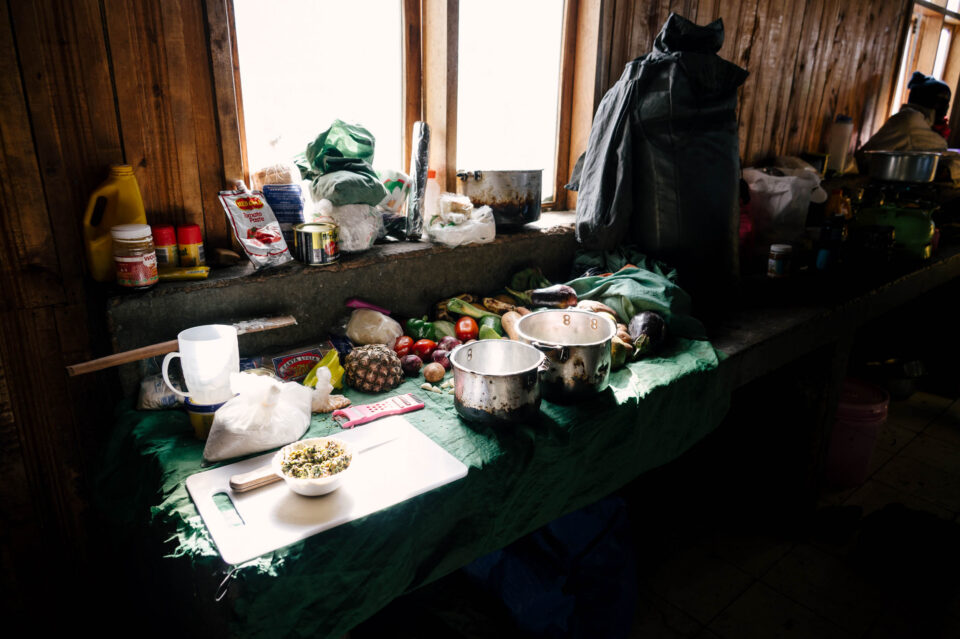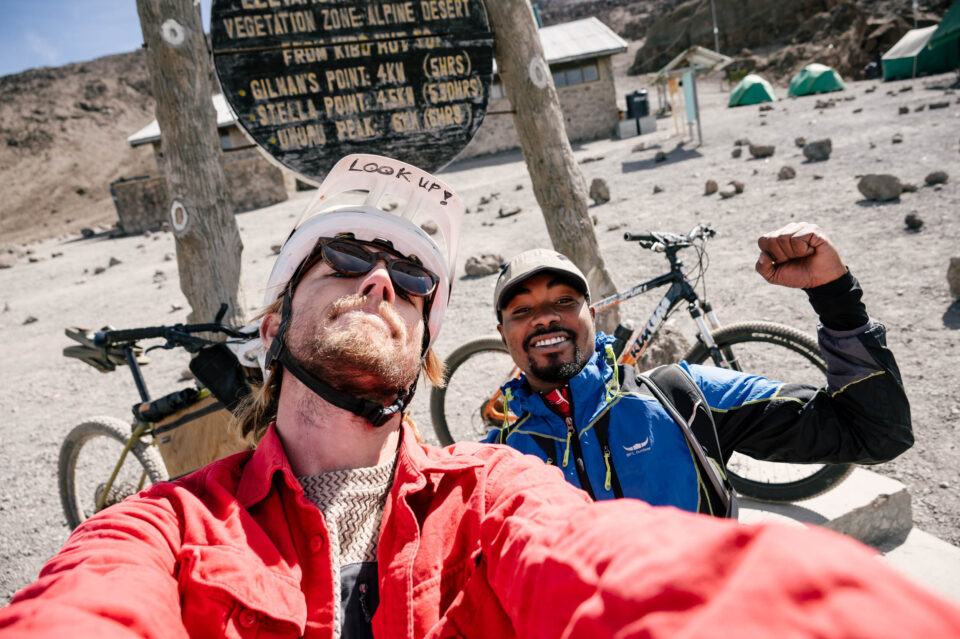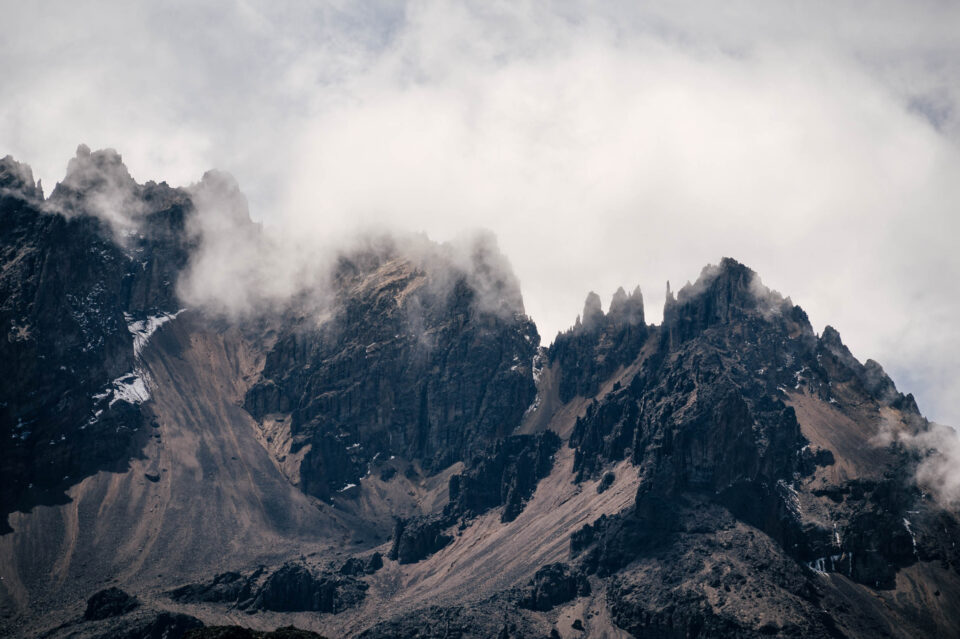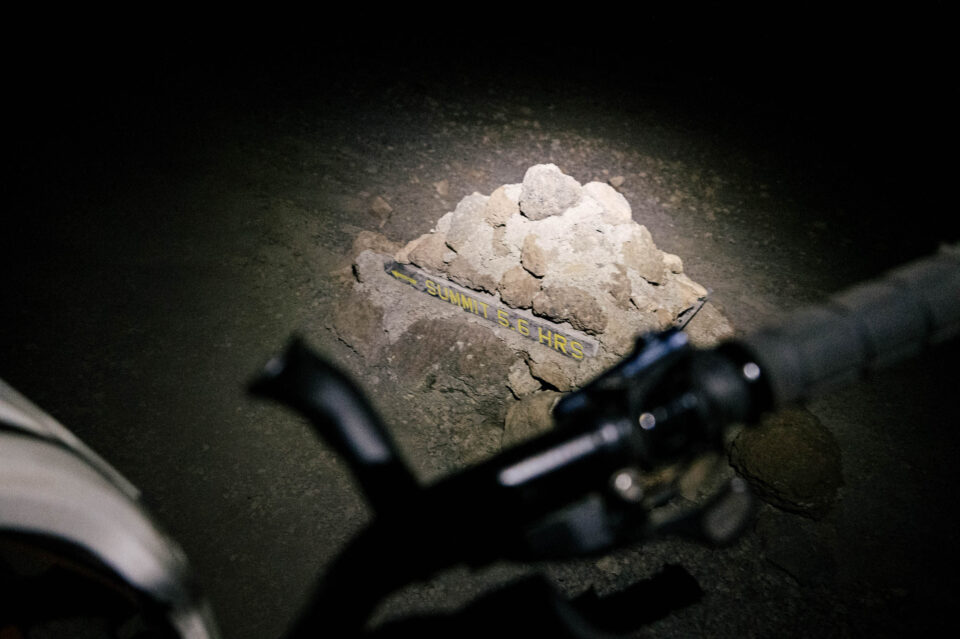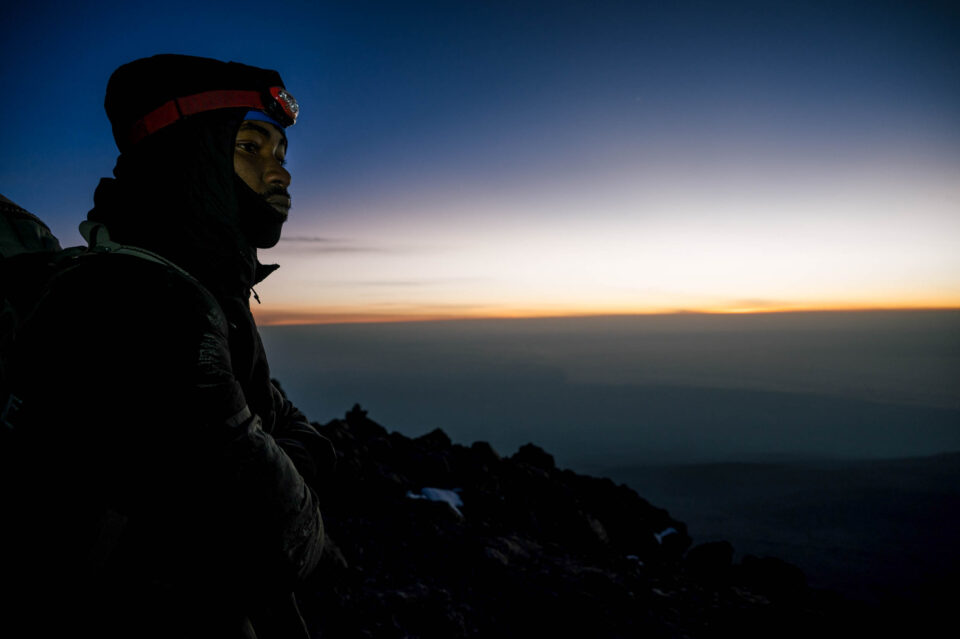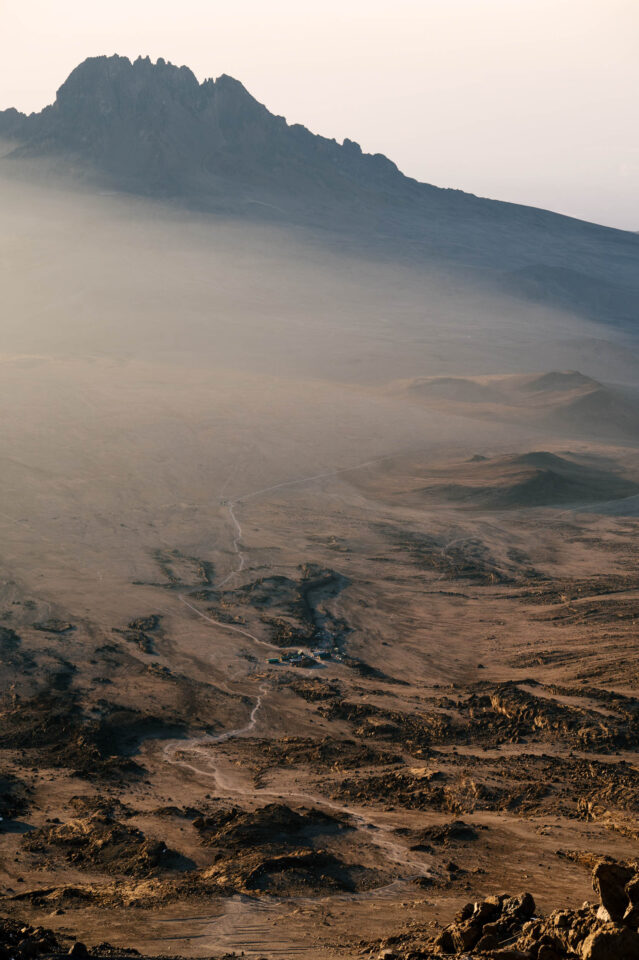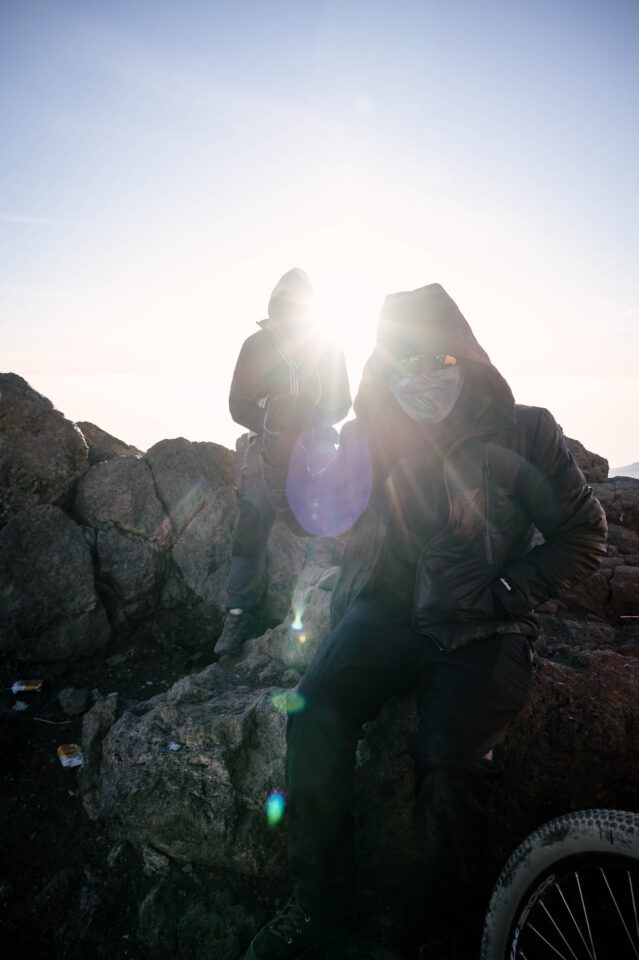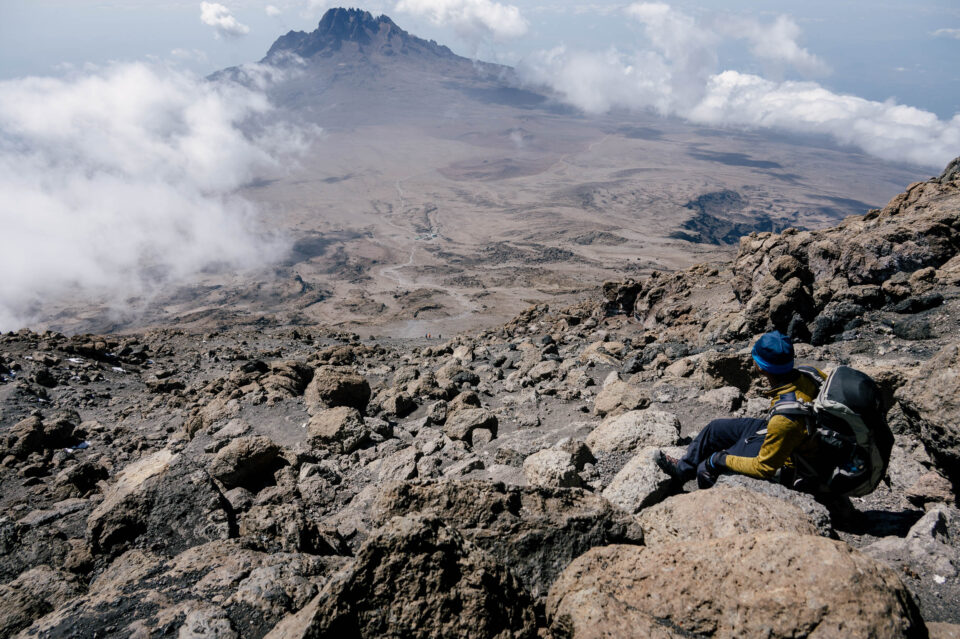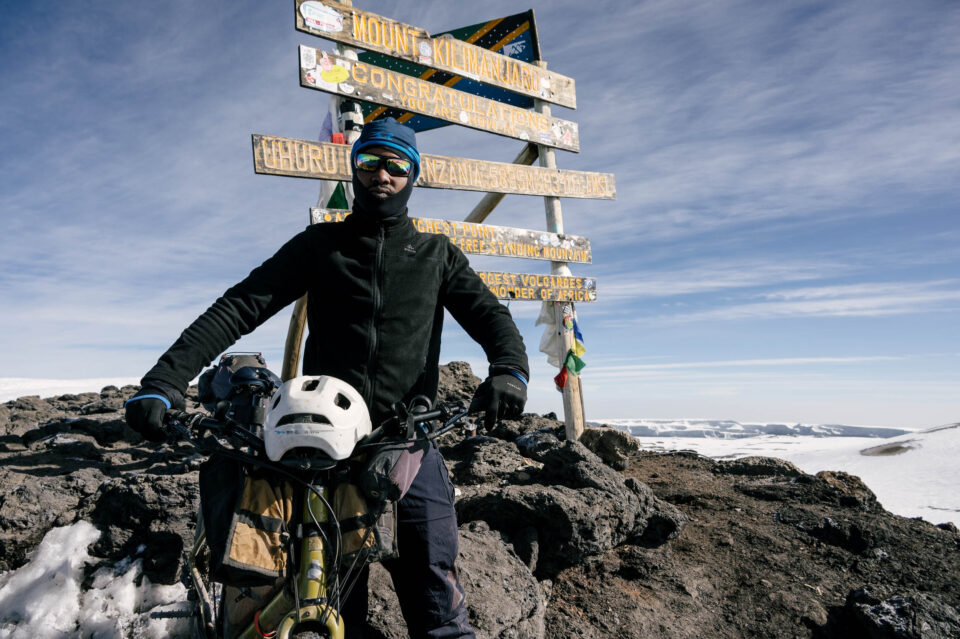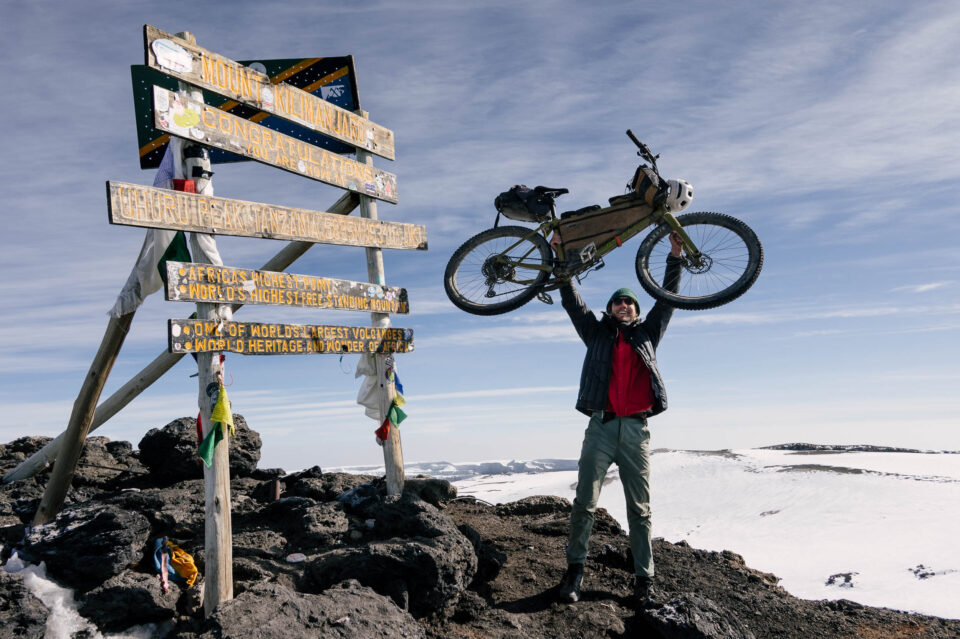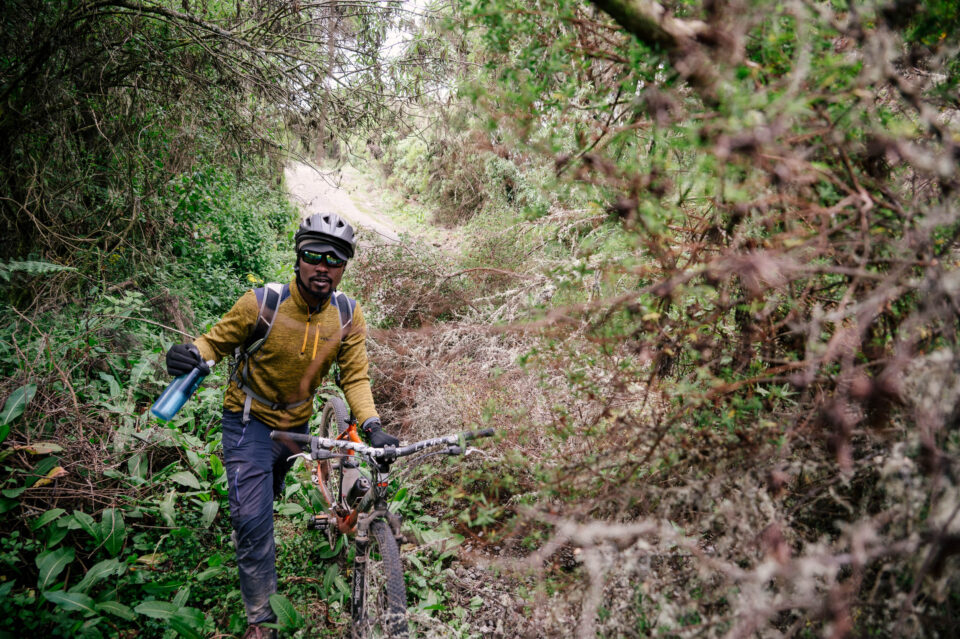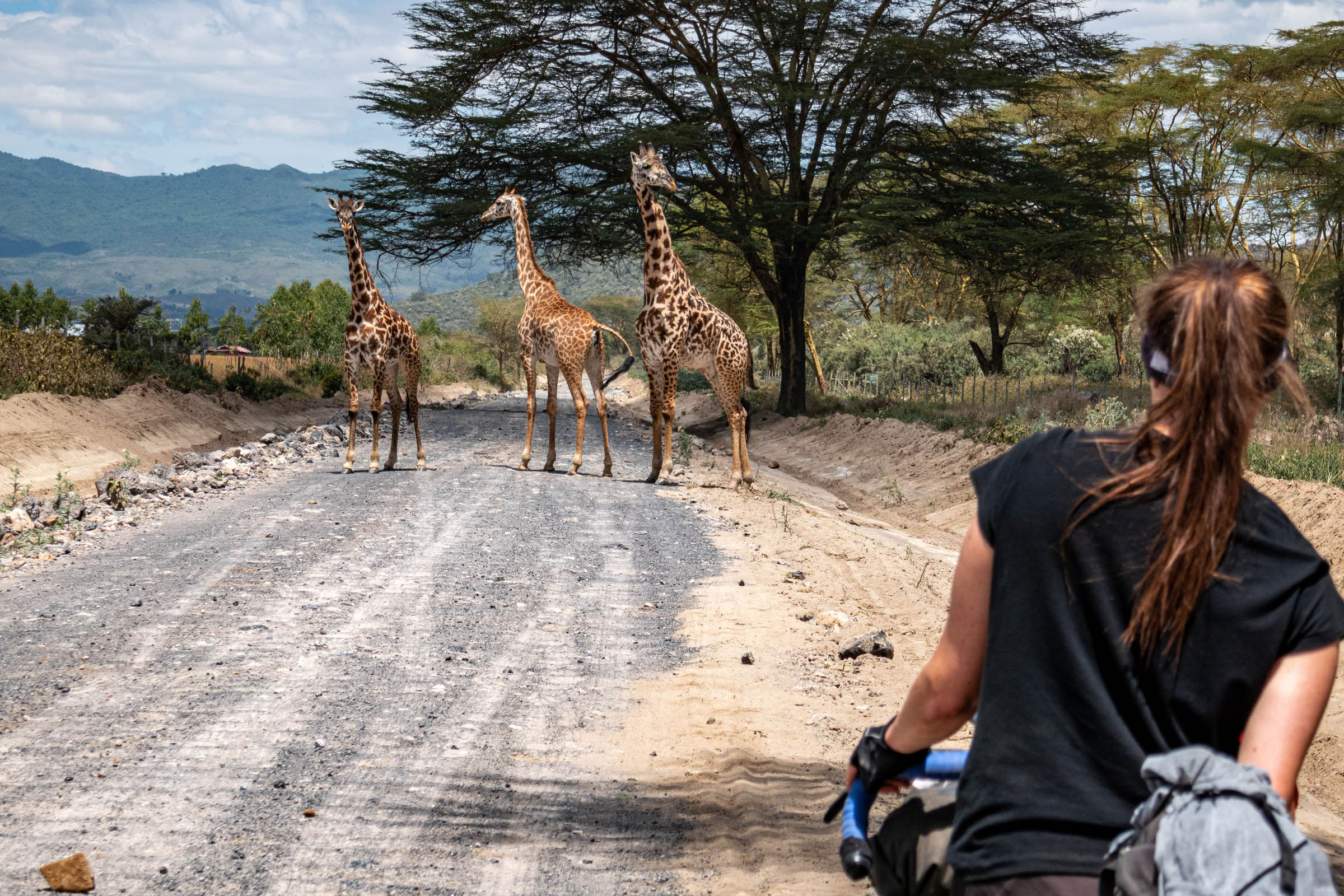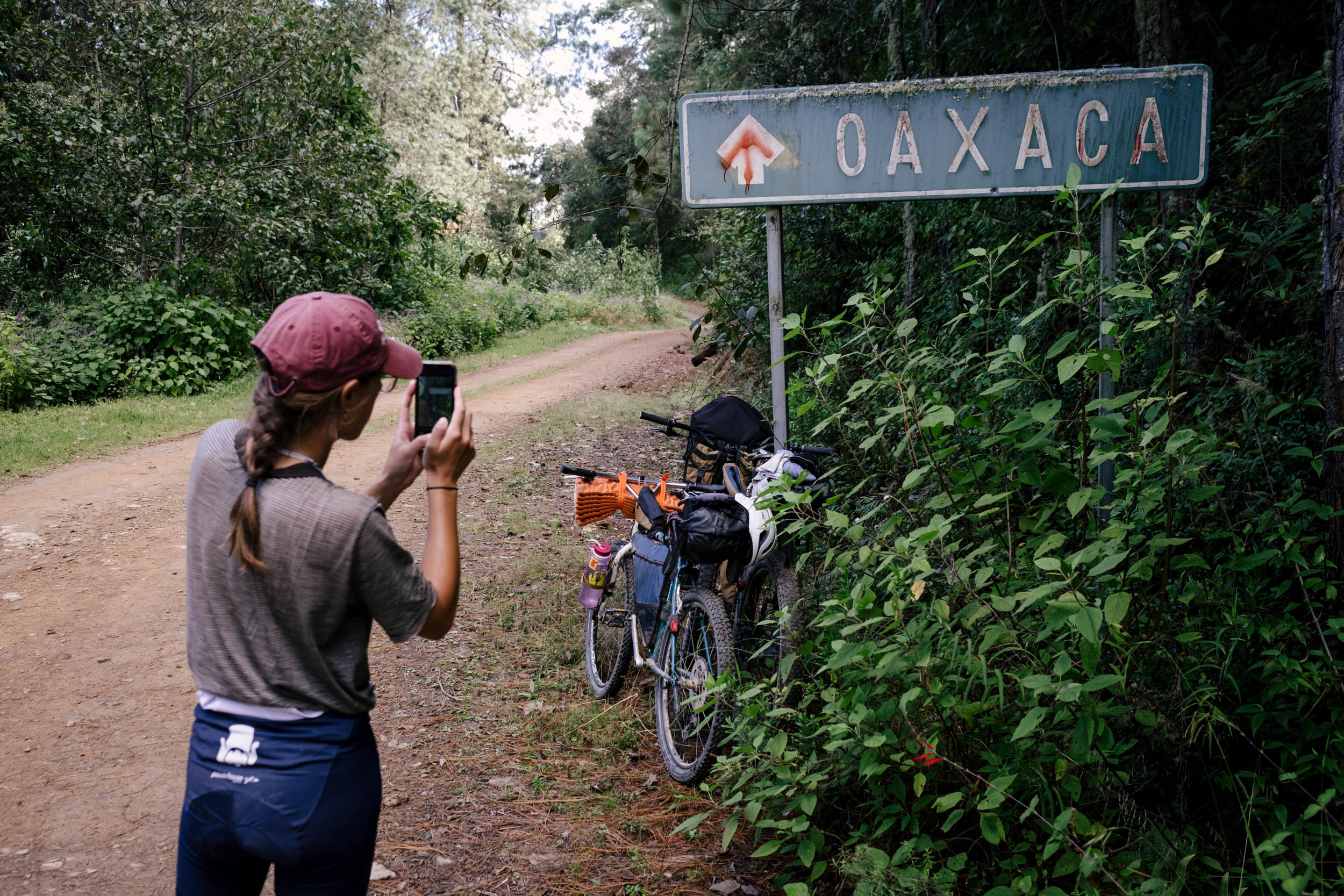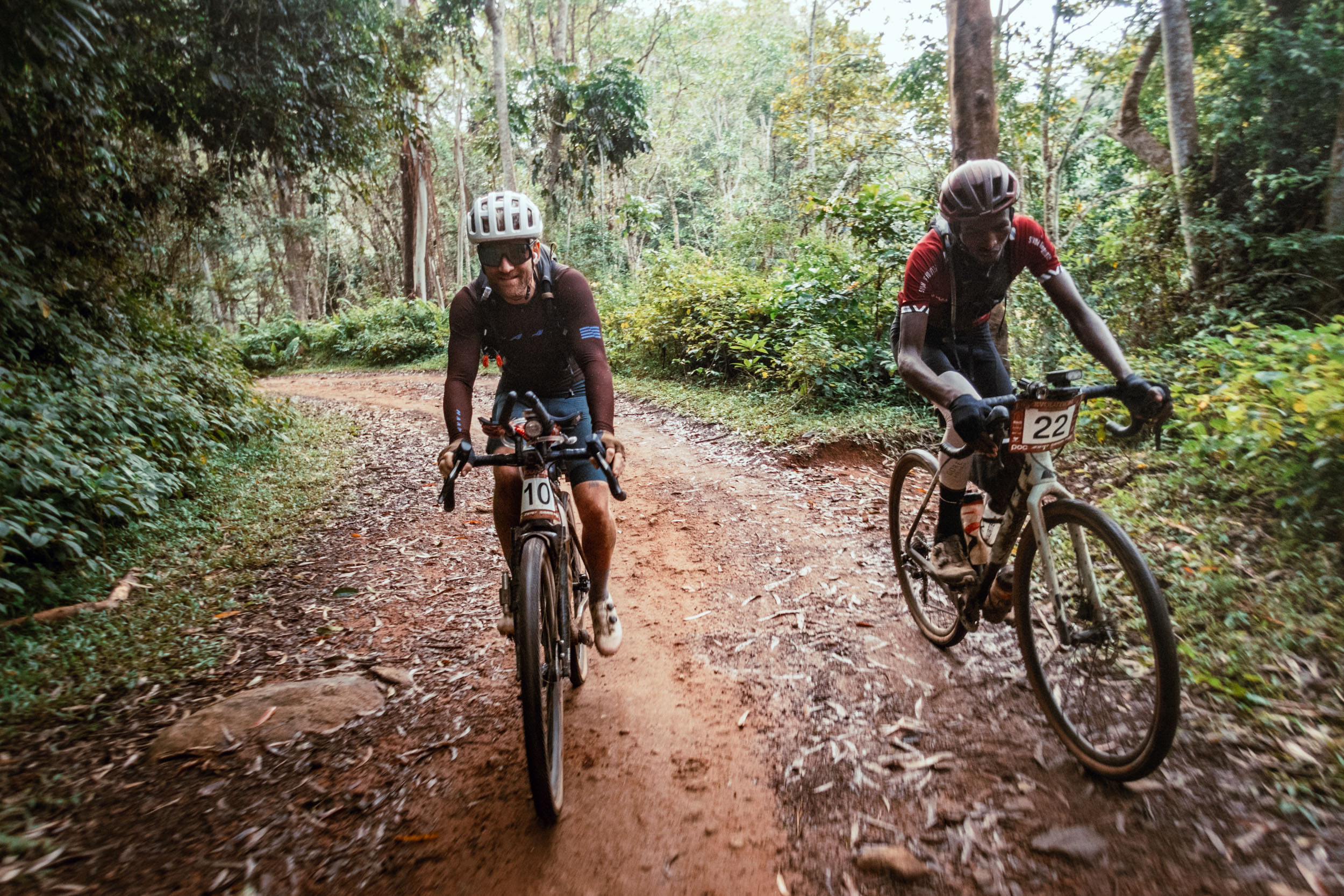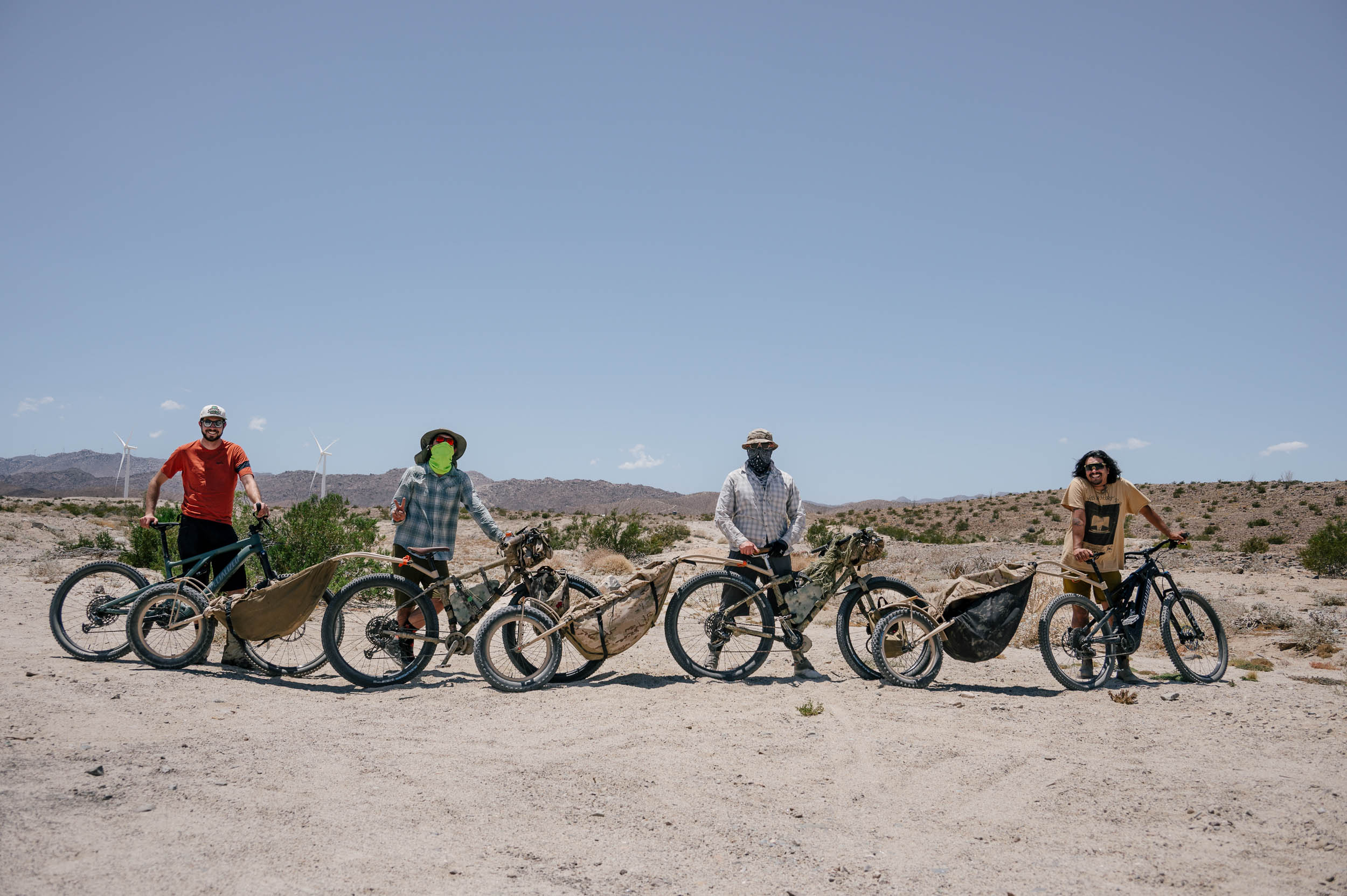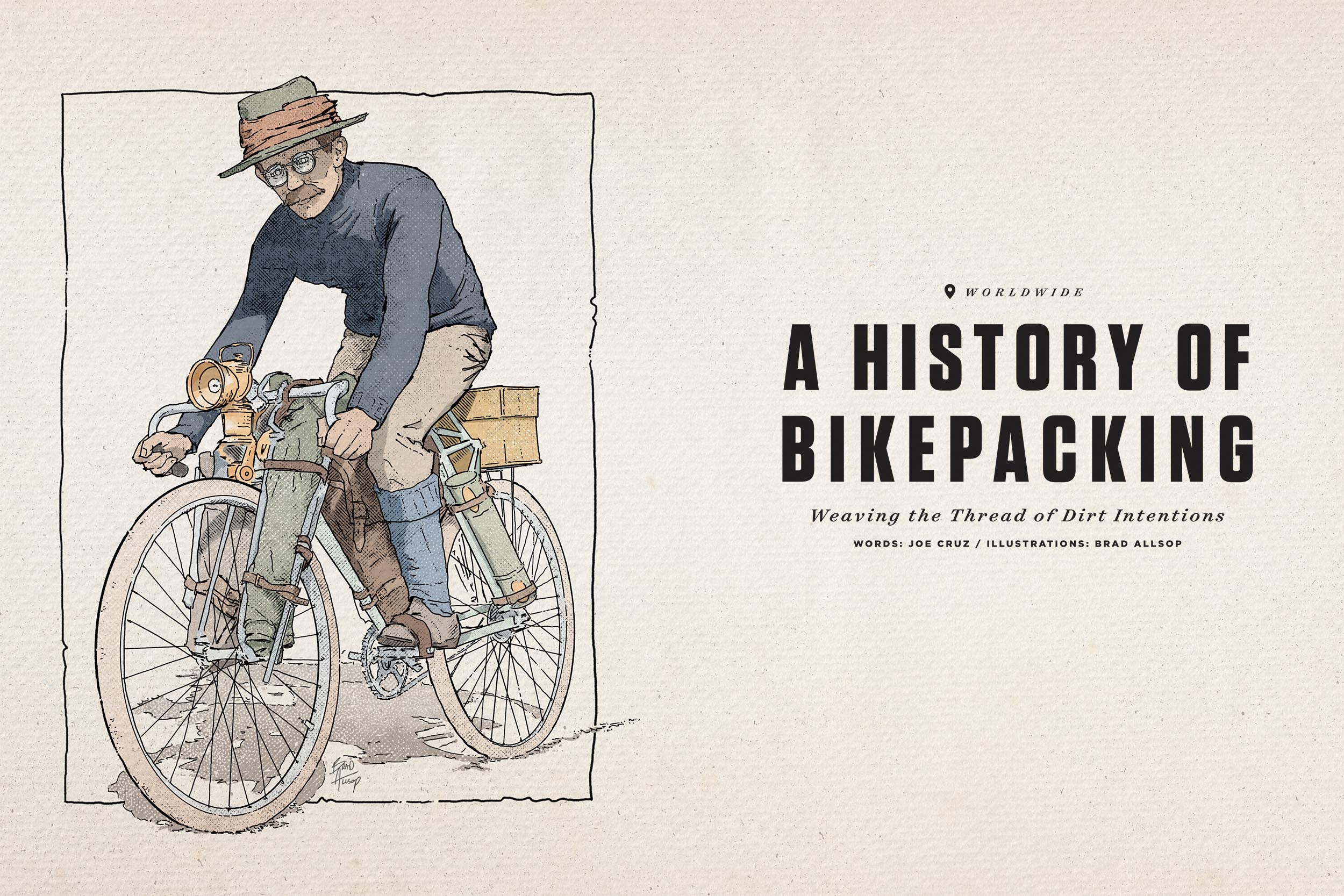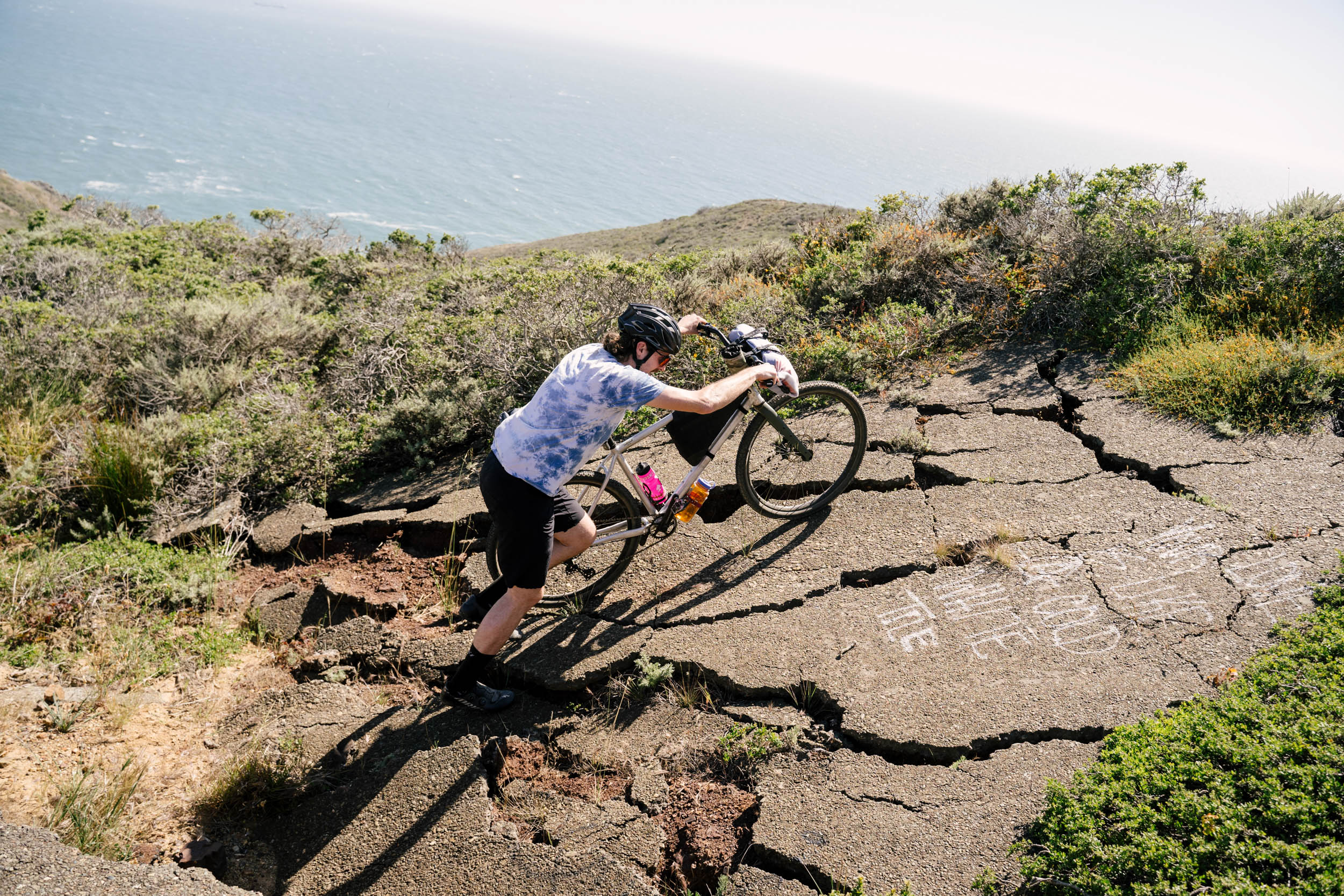Kilimanjaro
Capping off a long year on the road and three months in East Africa, Evan Christenson heads to the infamous Mount Kilimanjaro to attempt climbing the tallest freestanding peak in the world—with a bike. Along the way, he makes friends, and things go awry. Read on for the wild story and a stunning photo gallery you won’t want to miss…
PUBLISHED Jul 30, 2024
It hits like a drug when you walk into the room. Any room. Every room. You look, you wait, you see. It is as reliable as the sun. People turn, they grab their friends. They smile, they yell, they shake, they move. A push through the door is another dose. Cold blood and soft legs. A rush to the head. A mess of priority. A tunnel to the self. This is power. True and awesome power.
The routine, the reliance, the predictability. In these last several months on the road, I have been the first white man thousands of people have seen. Children cry and run for their mothers. Girls pull out my hair. Boys take selfies. Adults yell. It is never just nothing, the unremarkable passing by of a stranger in a supermarket, two paths that glance off the other, the world we are used to, the communities we humans have built together. It is never simple or easy. Life in East Africa, everywhere and every way, is intense.
Any unproductive work to return to sobriety will destroy the body. And the dangling of the mind in the murky waters of transient and rural East Africa will rot the self. After days and weeks and months of yelling, screaming, and shaking, of posing and smiling, calling and texting and moving and promising, after these days that explode into years, we must all admit that we have our breaking points. Surrounded in the market, 85 unread text messages, a stranger’s baby on my hip, another camera phone in my face, I had my transcendental freak out. I had to get out. I had to return to nature.
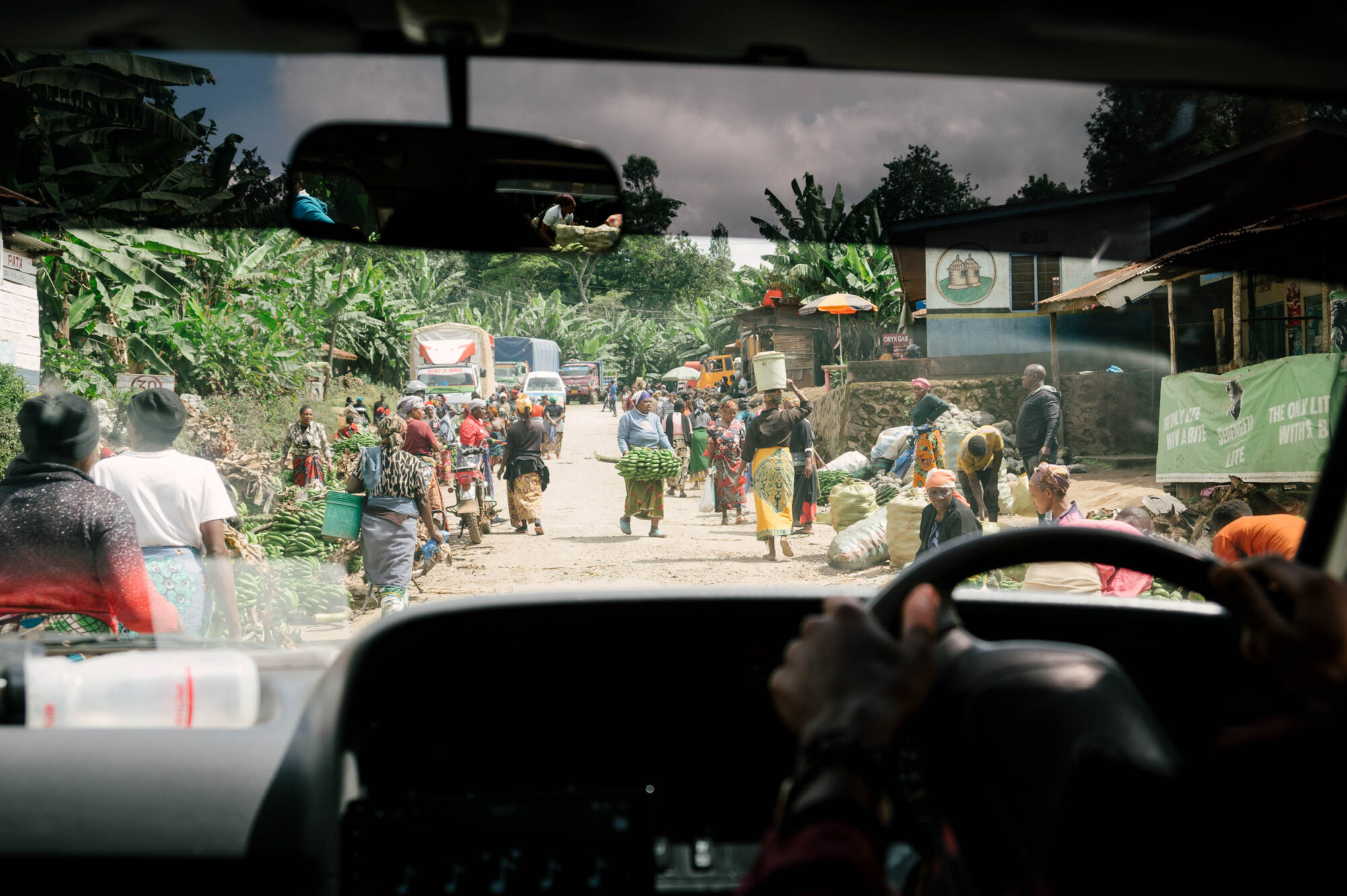
I never would have climbed Kilimanjaro. The over-touristed and outrageously expensive not even that hard hike up a silly mountain? Not for me. And that’s exactly what I said when Ricky asked if I was going to do it on my upcoming trip to Tanzania. He put down his drink and glanced sideways. He was smirking, knowing what I didn’t yet know. He said, “You know you can mountain bike it, right?” And with every comment from a stranger, every long day on the bike, every plate of ugali and growl from the stomach, that little seedling grew. The summit winked at me as I dirtbagged around the continent. It whispered as Bo and I rode around the backside. It sat firmly in my malaria pill dreams, the beast that could not be tamed, the mountain too tall to be ridden. My breaking point had arrived. I bought a bus ticket.
Zone 0: Moshi
Crane your neck and hang on. Kilimanjaro shoots out of the ground. Out of the sky. Out of the clouds. Somewhere, it rips holes in the atmosphere. The International Space Station scrapes its belly as it passes over the top of this thing. Kilimanjaro, when seen from the city at the base, doesn’t look real. It is a white triangle cut out of a magazine and glued onto the sky. It is so close and so far and so big and so shimmering white. It is so perfectly shaped it looks like a cartoon.

Kilimanjaro translates to “the white mountain,” but the locals call it the shy mountain because most of the time it’s hidden by its own clouds. My guide Victor and I ride his motorcycle to the grocery store. As he cuts through traffic and around the bend and the sky opens up, I finally see it for the first time. It towers above, and we sit together so small, together on this little red motorcycle. I shriek into the wind. I pull at my hair. I am hypnotized, and my eyes turn to swirlies. We are Frodo and Sam at the gates of Mordor. The great eye of Sauron is shouting down at us. We are pathetic to challenge this white beast. I yell to Victor, “NO way we’re going to bike up that!”
Victor looks me over. He’s done this a few times now. On bike about 20. On foot, another 50. He knows what works and what doesn’t. You don’t have suspension? And where are all your clothes? You’re just eating ramen? What do you mean you haven’t trained? Victor grew up on the base of the tallest freestanding mountain in the world. He rode to his mother’s shop to deliver the shoes she would sell that day. The bike became an extension, and he spent most of his time outside as a kid. And when the tourist boom began to hit and jobs as tour guides opened up, Victor learned English by watching movies and started climbing the big white pearl in his backyard. Today, it pays well. He likes to climb it. He’s eager for our early rise the next day. I ask him why he does this as the motorcycle accelerates through the next bit of traffic. He yells above the buffeting wind. I lean in closer. “BECAUSE WE ARE ADVENTURERS! WHAT ELSE ARE WE TO DO!”
I buy food for five days. He says it will be four up and one down. I will bring all the clothes I have with me. He says I need more. We go to the gear rental shop. We pass shops advertising expedition-style tents. I rent fishing boots, more socks, a thermal, and thick gloves. I didn’t know there was supposed to be snow on top. He says it may rain, that you never know what will happen up there, that our summit day will be very cold. We will do most of the final push at night. It makes no sense to me. I still don’t know why it’s done at night. But this is the way it is. I buy an extra few Snickers bars on the way out.
I walk back to the climber’s hostel and take in the town of Moshi. Today alone, I’ve seen more white people than in my last two months combined. A man walks up and asks if I’m going to the summit. He knows the guards and can get me an under-the-table permit for half price. Trinkets and paintings and deerskin drums and old backpacks for sale. I eat two dinners and try to sleep. I am nervous. This feels like a big project, and I’m trying to fling it all together in my final week in Africa. I am exhausted from months on the road. My tires are weeping sealant, my chain is rusted, my back hurts from lying in the aisle of the bus the entire night prior. I know nothing about what’s going to happen. We’re just going to climb up a mountain. How hard can it be?
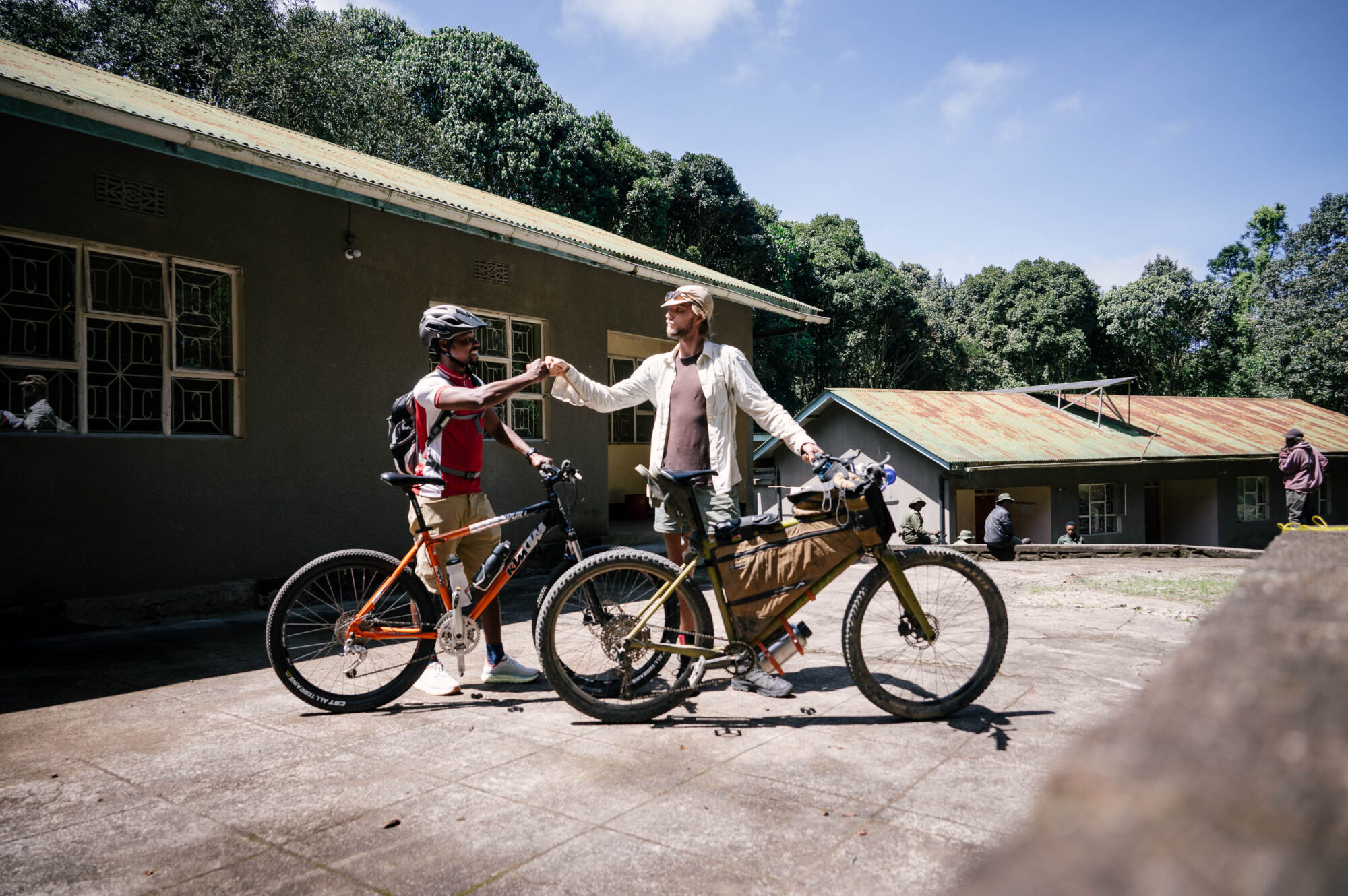
Zone 1: Cultivation
Kilimanjaro famously has five unique vegetative zones as you climb from 2,300 feet to 19,341. Our group piles into the car, consisting of me; Victor; Mr. Steve, the chef; Rafaeli and Alpha, our porters; and the driver, flies hounding his Rastafari hair ties and dreadlocks, the dreads swaying as the car bounces over the dirt roads, the car buzzing with chatter. We begin in the cultivation area: maize, coffee, avocado, and banana in order as you ascend. It is a Monday morning, and I am changing into my bibs as the van bounces and the flies circle and the music blasts and the people ferry cut stalks of banana onto the roads around us. We sign in at the gate for bicycles. I count 70 riders before me. I am not the first to do this. Definitely not the last. But it still feels special. Victor’s last client was a 68-year-old man from California. Victor says he was a photographer from National Geographic. I laugh. How cliché.
Zone 2: Rainforest
Onto the bikes, and I am still nervous. But the bike returns me to a sense of normality. We now can’t see where we are headed, but I know how to ride. And I’ve ridden this bike for months now. Coming back to it is like coming home. Victor and I begin pedaling and poking through the bounds of small talk: god, family, Tanzania, farming, travel, life. Immediately, the road is quiet. There is no one to holler my name. There are no motorcycles. Victor hangs back on the long passes, and I, for the first time in months, can find a breath. I lose myself in ferns and moss and vines and butterflies. I find peace in the circles my legs spin. The shocking contrast reverberates in my ears, and I feel strong as the bike fights gravity. Peace. Breathe. Settle. We go on.
He didn’t mention it earlier, but now, as the sun begins to set and the climb extends from here to eternity, Victor says that the first camp for bikers has been removed. We must climb what the hikers do in two days in just one afternoon. The sun falls behind the peak; we are early into the shadows. Victor begins to bonk. We haven’t talked in two hours. He nods when we meet up, out of breath, tired. I nod back. We’re almost at 11,000 feet. The air begins to thin. It is not easy, not from the start, not right now. It never will be. He nods again up to the first camp, and we ride on. We can see it for hours. It inches into view. It never seems to get closer. We will arrive in the dark.
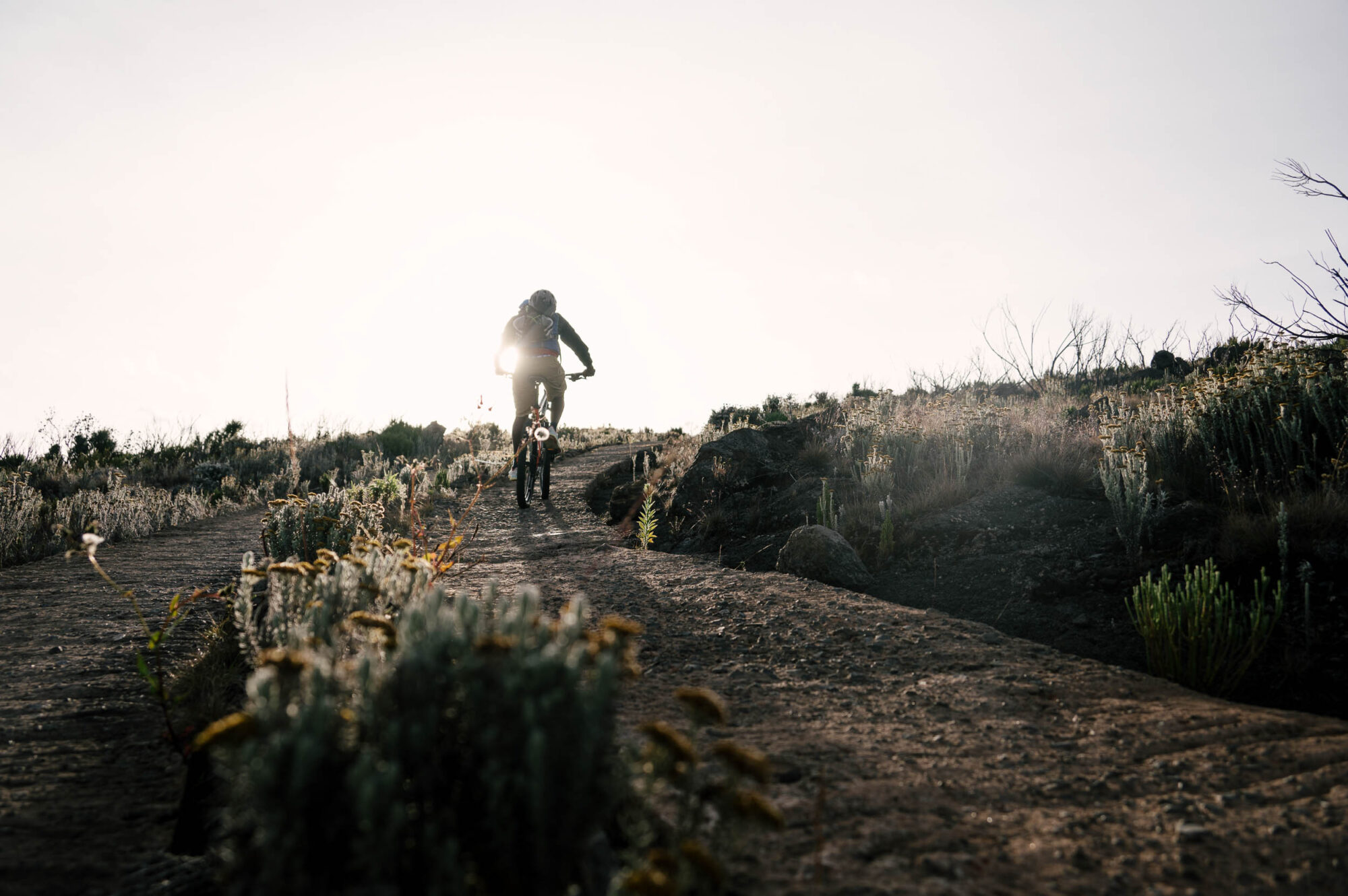
At camp, I am the only mzungu in the kitchen. I feel weird eating alone in the dining hall, removed from the men working for my goals, so we eat together. We share food. We watch music videos and make jokes, and I settle into my Chaga road family. Mr Steve is the patriarch of our group. The oldest and wisest, he cooks the food and keeps us together. He wears lycra and pins a number to his bike when the local races around the sugar cane fields happen. He laughs like he’s yelling. And he laughs a lot. Rafaeli, the porter carrying Victor’s gear, is young and hip, clean-shaven and patient, wearing streetwear clothes and earbuds. And Alpha, new to the rest of them. Quiet, respectful, reliable. He talks the least. But he seems to always be paying attention. He shoulders my food and clothing. This makes me uncomfortable, but it is the nature of this beast.
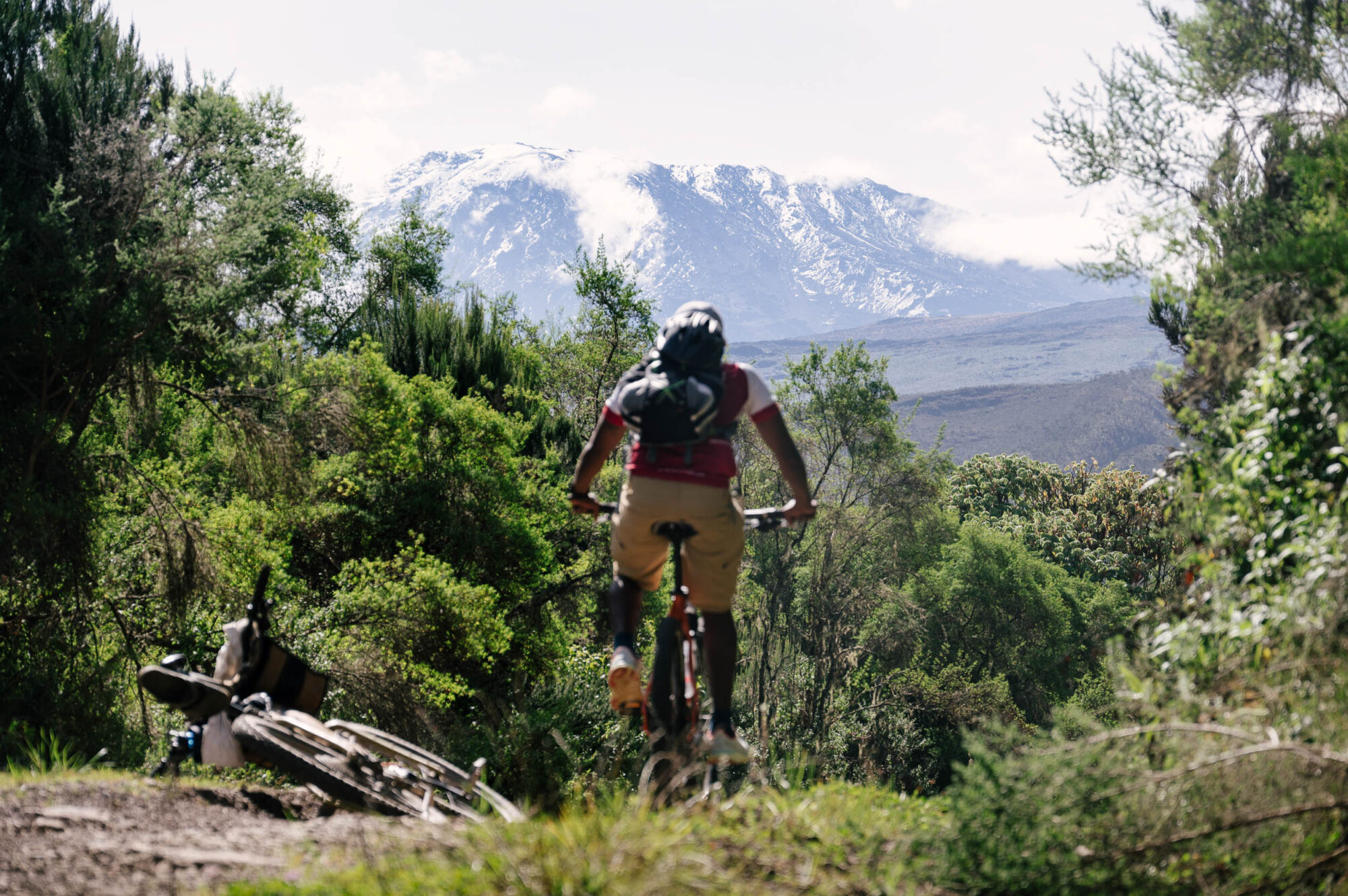
Zone 3: Alpine Moorland
On day two, we are the last ones to leave the camp. It is quiet up here. Surprisingly so. The rooms are at quarter capacity. Porters loosely dot the dirt road, and we join the hiking trail. Our progress is so fast we stop to have snacks, take photos, talk, nap, and eat. Victor smokes a joint in the toilets. I refrain, too worried about my asthma, now pushing 13,000 feet and staring up at the volcano towering above. Yesterday, my nerves fell away as I settled into the familiar routine of riding a bicycle up a hill. But now, riding closer and closer to the cone of the volcano, seeing how it pulls in and towers above us, an elevator to the stratosphere, a stairway to heaven, the nerves are back. Even worse now. It is just a messy scree field up a wall. The “trail” is invisible, and the peak is a million miles away. And I’m going to bring my bike up there?

We push through the final spring. The cold air comes blasting off the peak, and storm clouds roar up from the valley below. We are alone on an island, tiny bodies in this great expanse, blind to the chaos 10,000 feet below us. Climbing Kilimanjaro is like being in an airplane, looking out at the world below, the tops of the clouds, the further, faint whispers of civilization. We feel completely alone here. But the silence is punctuated. A rescue helicopter rips through the clouds and races over the edge. We step aside as a young Tanzanian man is carried past on a stretcher. Men come down out of breath, saying they couldn’t make it. I flounder in a mix of doubt and belief. It is there. It is so big. We will go. But maybe we fail. We can do this. I think so. I’m sure we’ll at least find out.
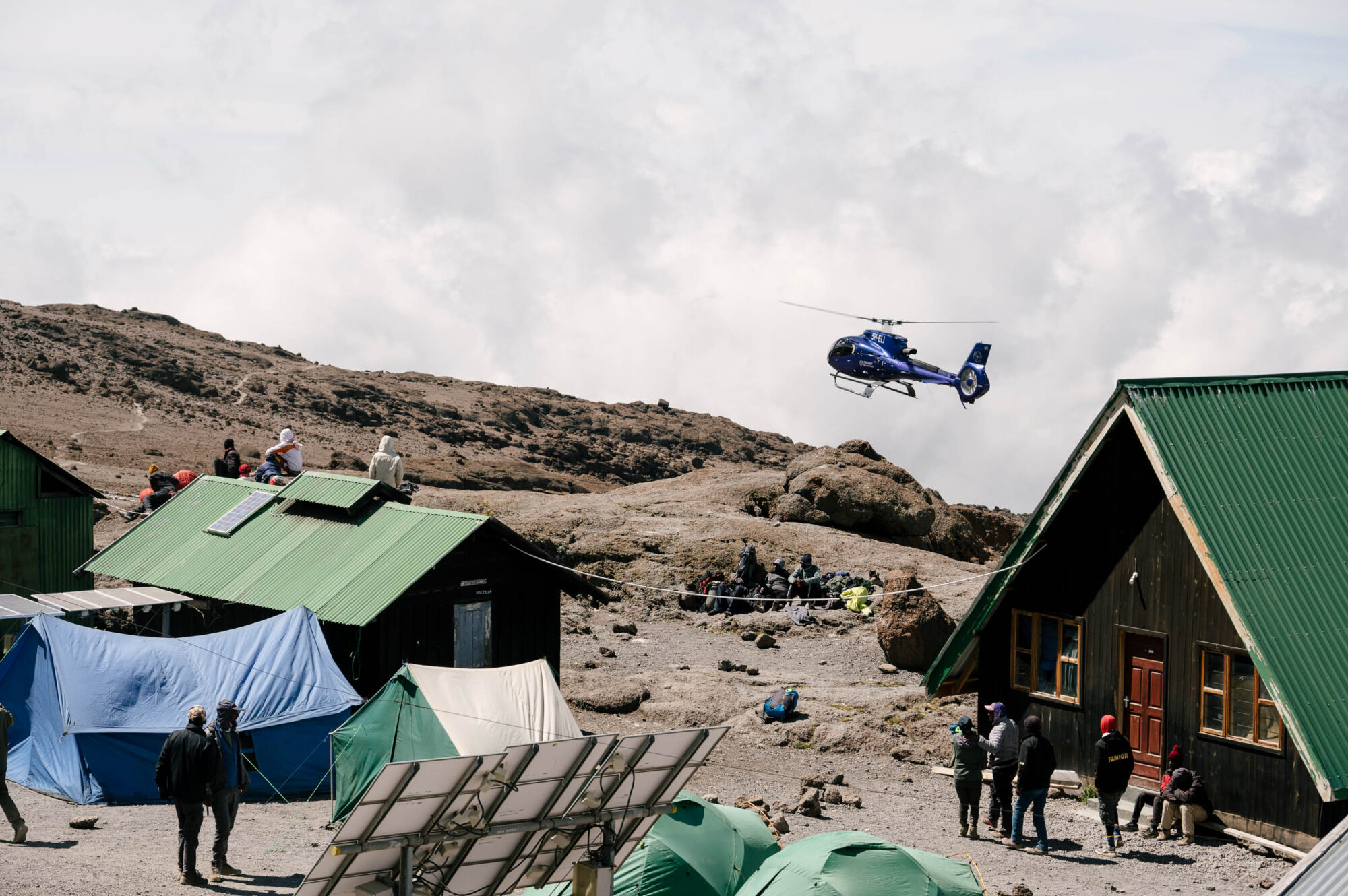
Zone 4: Alpine desert
We reach the final camp. There is no running water. The porters go and fetch it with plastic buckets on their heads. We stay an extra day here, “acclimating,” though I believe it to be too little, too late. It’s my second day, and we’ve already gone from 2,000 feet to 15,500 in 36 hours. The little I know about altitude makes me think we’ve already gone too fast. Acclimatizing should be slower and lower down. But we are here. We must go on.
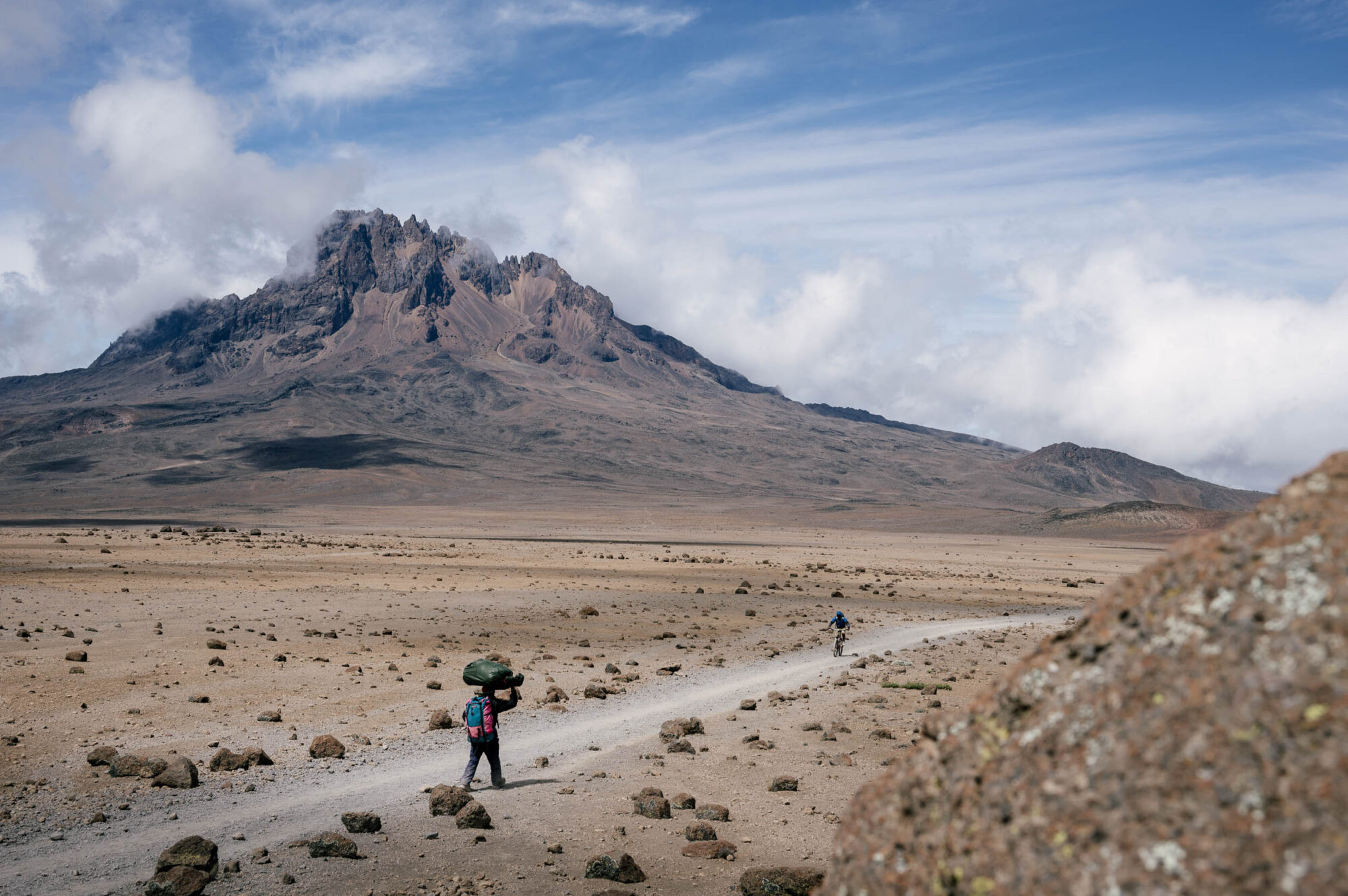
We pedal around, and I am completely empty as we try to climb back to base camp. I lie in the sun and make small talk with the alpinists. A group of three Argentinians working on the Seven Summits project have a team of 19 porters. One porter’s entire job is just to carry and clean a special toilet for the climbers. Time passes. We are in a blur of activity. Everything changes, and yet nothing happens. Eagles, clouds, wind, cold air, and raw sun. Burning plastic, fried dough, ugali, water filter, stinky socks. We go over the plan and discuss the porters, the departure time, when, where, and how to go. What to expect and what to do if it goes wrong. Everything up until now has been straightforward. But again, my nerves build. I’m reminded that this isn’t promised as yet another helicopter comes whirring over the ridge. They take a man my age out on a stretcher. I have ridden this rollercoaster from nerves to peace and back to nerves. In a few hours, we will awake at midnight. We will begin pushing at 1 a.m. Victor says we won’t be able to ride for most of the way. I am nervous.
It is this delicate balance between melodramatic showmanship and high stakes, alpine seriousness. I’m told some of the guides come and hike up here for fun on the weekends. And I’m told a lot of people have died up here. Some tourists come down and say it’s easy. Some are helicoptered out. The bike has made our trip to the final camp a lot easier. But I know it’ll be an anchor on the way up tomorrow. The summit at 19,341 feet is way higher than I’ve ever been. But it’s really not that high.

The guides carry oxygen tanks but they rarely use them. Hundreds of people have suddenly converged at this final camp. What had been quiet is now a circus. Victor warns sometimes you have to wait in line for two hours to take your picture next to the sign. That is apparently all we do this for—the picture, with a wood sign, just for a few internet points. I crouch over the pit toilets and try not to notice the rotting shit and the flies when a man comes in panting and lets go a waterfall of diarrhea. I stomach another bowl of ugali and try to get some sleep. I lay in bed for hours. I will get none.
Zone 5: Arctic
The Argentinians are up first. Their heavy boots rattle the hollow wood cabin. I get out of bed early. Mr Steve makes tea and porridge. I take one final altitude pill. He pats me on the back. We peer at each other through headlamp beams and icy eyes. Mr Steve goes back to sleep. People outside yell into the black void. Chants have taken over base camp at the lowly hours of the night. It is summit day for all of us. Rafaeli pushes Victor’s bike. Victor carries the emergency gear. I push my bike. I am wearing everything I own and everything I’ve rented, and I quickly begin to freeze in the midnight air. We go. The sign says six hours to the peak. I’m sure it’ll be more than that.
We begin the push through the deep scree. The moon has set. The Milky Way stretches out over our heads, and the mountain pitches up ahead of us. One foot, two foot, drag, rest. We come across a woman collapsing into the scree, heavy panting and hazy eyes, a haunting shadow of the night. Soon, we find more climbers out of breath and hunched over their guides. They all turn back. The lamps of the Argentinians are already halfway up. Together, we go on, pushing the bicycles.
Victor plays Bob Marley on his speaker, and the cool midnight air and the nerves blast us awake. I feel powerful as we push for this storied summit. I feel alive, present, and eager, dancing to Trench Town Rock, a shower of meteors spraying the ink-black sky our headlamps penetrate. I know we are going to summit today. We can do this. We are young. We are powerful. We are alive. We are unstoppable. I lean into the mountain as it pitches up further. I smile for hours. It is endlessly beautiful.

A group of Americans are resting above us. Their guides and porters are chanting. I am huffing cold air into my sandwich bag lungs. We stop for food. My water bottle is frozen. I cannot eat. They push on. We follow closely. One of the Americans keels over in the dark and begins to puke. Violently, retching, doubled over. Five pukes, six pukes. We walk around him. We wait for Rafaeli. Another person turns back.
We are at 17,000 feet. It is three in the morning. My stomach explodes. I walk off the trail and over to the cliff, into a minefield of poop and toilet paper and I hold onto the rocks and release my own hot volcano of diarrhea. I try to hold in my vomit. The vibe has changed. The energy is gone. We turn off the music. We put our heads down. We go on.
Hike. Push. Stop. Breathe. Hike. Push. Stop. Breathe. Hike. Push. Stop. Shit myself.
Fractals begin to linger in the glowing beams of my icy headlamp. I see shapes and stars and lines and colors. I see my mother. I see myself in the rocks. I see Mordor. I feel delirious. My head is a helium balloon detached from my body. My body is too cold to ache. My toes are frozen, and my stomach is battery acid. The mountain is steeper now, a slew of boulders and sand. I put the bike on my back. We go on.

The horizon below begins to wake up. A slow burn of color. The sun will come next, and we will be fine. I tell myself this repeatedly. We just need the sun. It crawls so slow when you really need it. Faster, please. Oh, fuck me, it’s so slow. I sing the Beatles. We push on.
Victor says his stomach is bad. He walks off the trail for his own diarrhea. We are together and a complete mess. I think of this image—this beautiful mountain, full of legend and history, mystical and massive, and all these random mzungu coming from America to puke and shit all over it. I chuckle. I feel bad. It’s too late now. We go on.
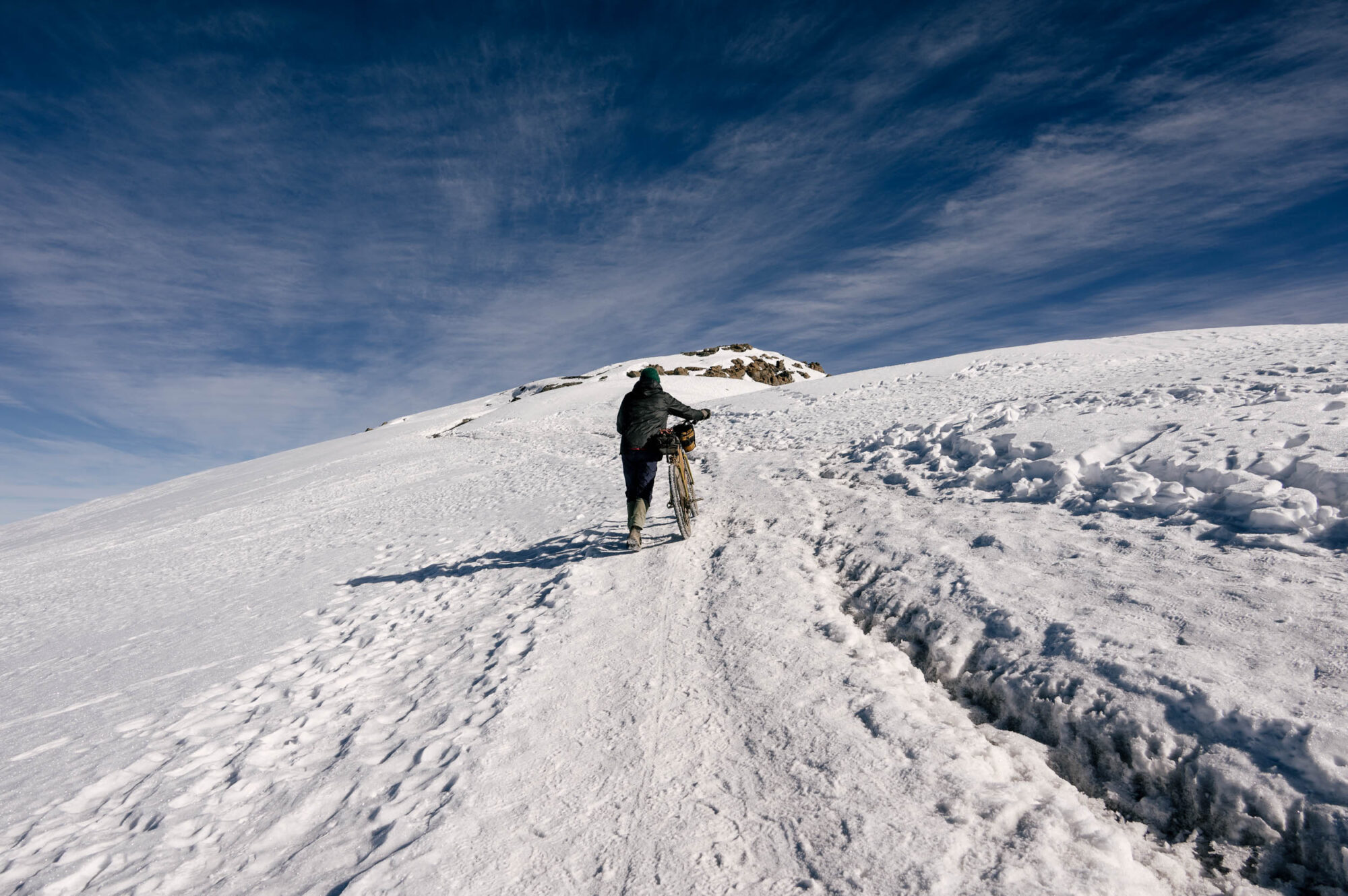
Six hours later, we make it to the rim. The sun is out. Ice reflects the blinding morning rays. We look down at the glaciers, and it is a cold world of black and white and dark blue, of sharp edges and soft snow, crystal ice, and volcanic stone. Rafaeli is sick. Deflated and nauseous. He says his head can’t take it. He turns back and takes Victor’s bike with him. We are almost there and yet so far away. We must now walk around the rim and climb another 700 feet. We’re at almost 19,000 already. The trail flattens out, and just to prove a point, I ride my bicycle. People take videos and cheer me on. I am too out of breath to say anything back. I am too out of breath to pedal. I resort to pushing.
We get to the snow fields and climb. I wait for Victor. He wants to turn back, but after this crazy week, after all the meals we’ve shared and the jokes and the stories, he feels like my teammate. Like my brother. Like I can’t finish this alone. I wait for him, and I think of all the times he’s walked this trail just for a mzungu to take a picture. It feels trite, all this work just to stand on top of a hill on the other side of the world. But it feels like finally I am powerful. With the peak in sight, I know it. Here and now, I can carry the world. It feels arbitrary and silly and yet it feels like shooting lightning from my hands. I am just a lowly tourist. But I am Zeus. I am no one. But I am a badass. I am a narcissist. I am another one of the many thousands to be here. I am alive. Incredibly and powerfully alive.

I ride to the summit. I can barely breathe. There is no line. We pushed so slowly that there are only two people there now. Everyone else is on the way down. I slap the sign and raise my bike and cheer. I hug Victor. We sing, we dance, we make jokes, we party. I try to appreciate the view, but there’s almost nothing to see. The valley below is so far it is a mess of clouds and green blobs. The glaciers and the ice fields and the snow and the rock. The sign is covered with stickers, the wood is worn, the paint is chipped. It is surreal to finally see it in person. I am so proud. It feels really like we actually did something. To stand here is to stand tall with authority. It is a Thursday afternoon, July 4th. I am on top of the highest point in Africa. The highest freestanding mountain in the world. With a bicycle. What’s the point? I don’t know. But damn, it feels good.
I make small talk with a lady from New York. She just climbed it to celebrate her 50th birthday. We take in the view and talk about Africa. I talk with the other guides and make my one joke in Swahili. As soon as we finish, the elation is over. My stomach rumbles, and my water bottle is still frozen. I am sunburned, and it’s only 8 a.m. We must go down now, and for the first two hours, it’ll be too steep to ride. Every step I take, my stomach turns, and I wince. We bumble down.
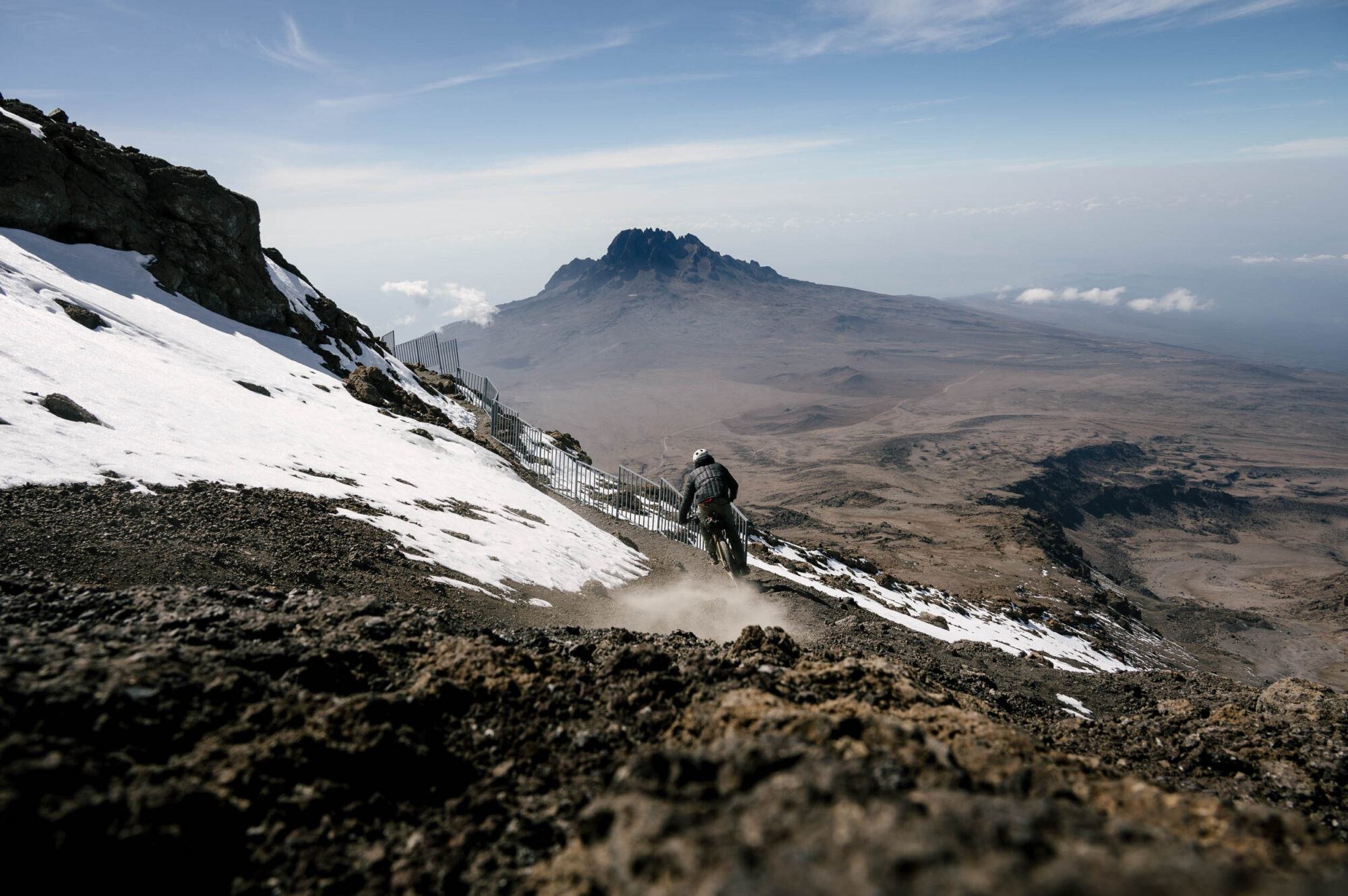
We hike back through the minefield and I’m a tired, shit-stained zombie with a fat congratulations self-patted onto my back. It makes the walking no easier. The volcano begins to taper off and the scree gets deeper and Victor runs down the mountain. I try to ride, and I crash. I try again, and it finally works. I am suddenly a Red Bull athlete doing 100 miles an hour down a wall of sand in a free-ride movie. I do triple backflips and 360s off kickers made of turds and skids on the toilet paper. I descend so fast my brakes smell like pot roast, and I lie in the sand and wait for Victor. I crash again in the deep sand and make a sand angel. Now that I can ride again, the pain is gone, and the warm mid-day air shines unrestricted, and the easy gravity and the peace and quiet and the words I did it I did it I did it! ringing in my ears, it all feels so good. These moments are the best part of my year on the road. Maybe of my life. Descending scree fields and flying downhill, the peak in my pocket, and finally going home. Kilimanjaro is my cherry on top of an intense year away. And how sweet it tastes.
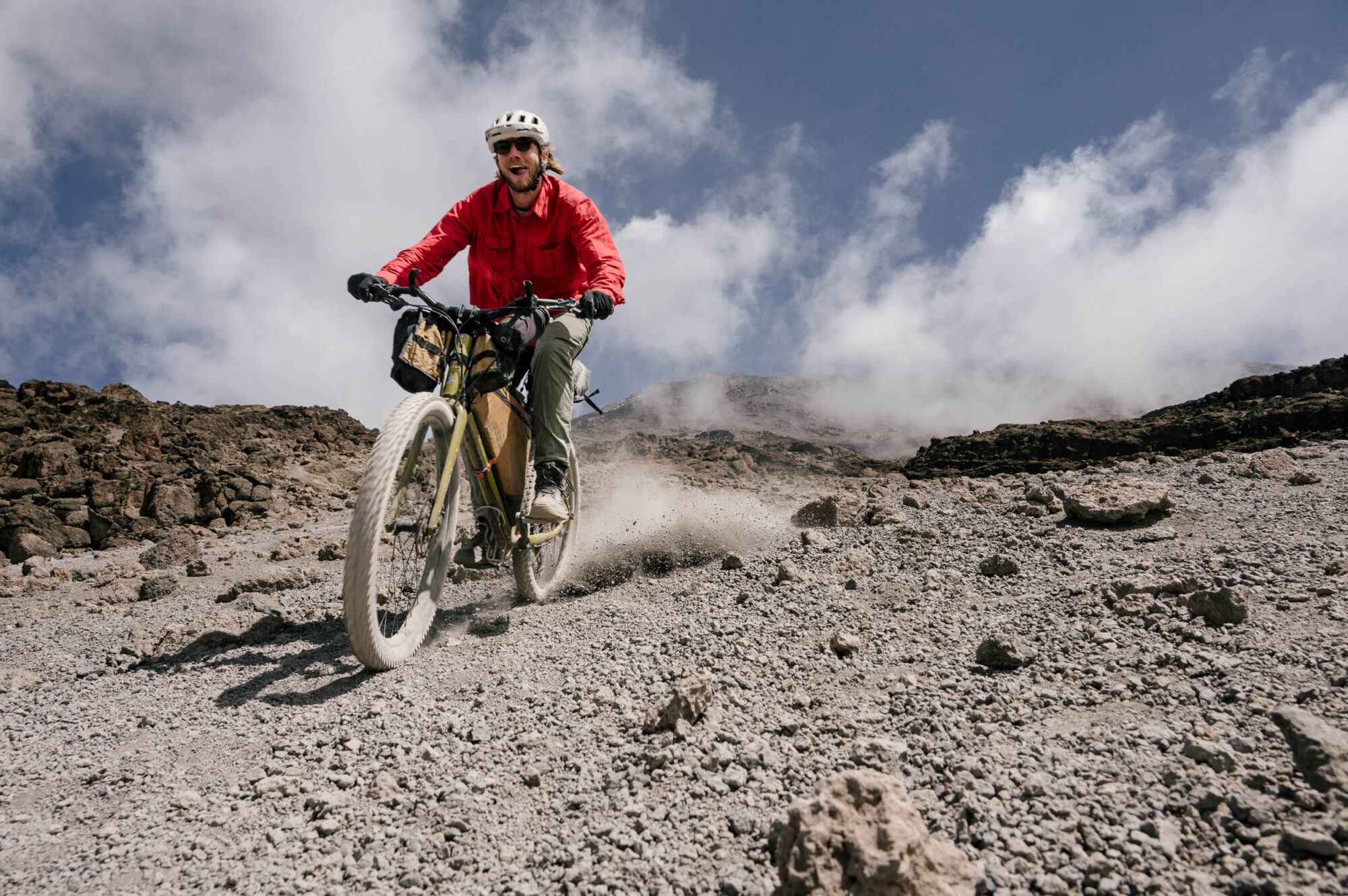
Victor gets his bike at base camp, and I hug Mr Steve and Rafaeli and Alpha. Victor and I descend like rag dolls dropped out of an airplane. The hikers take two days to get down. We make it out of the park gates in four hours. We fly through the different ecosystems, the air gets thicker, warmer, muggier, and civilization comes into view. I am too tired for photos, for wheelies, for skids. It is the longest continuous descent of my life. I vibrate at the bottom, a buzz of adrenaline and no sleep and tired legs and an empty stomach and the relentless shaking of the rocks. The rangers invite us in for ugali and dried fish. I almost vomit at the thought. I pick at my fish and decide I want to finish the descent into town.
Zone 1: Cultivation
Victor and I ride out of the park and back through the fields. Kids are in the road walking to school, craning their necks, pointing and yelling. I went to Kilimanjaro to get away from the heckling, to find peace, to get back to nature, to feel my legs burn, to be alone. The kids yell “MZUNGU!” as Victor and I ride through the fields, cut banana stalks and Coca-Cola advertisements blurring in the periphery, charcoal fire and motorcycles in the roadway. I have a flight home in 24 hours, and I will finally leave the African continent after nine months. I smell the charcoal and the mandazi. I give the kids a high five and a smile.
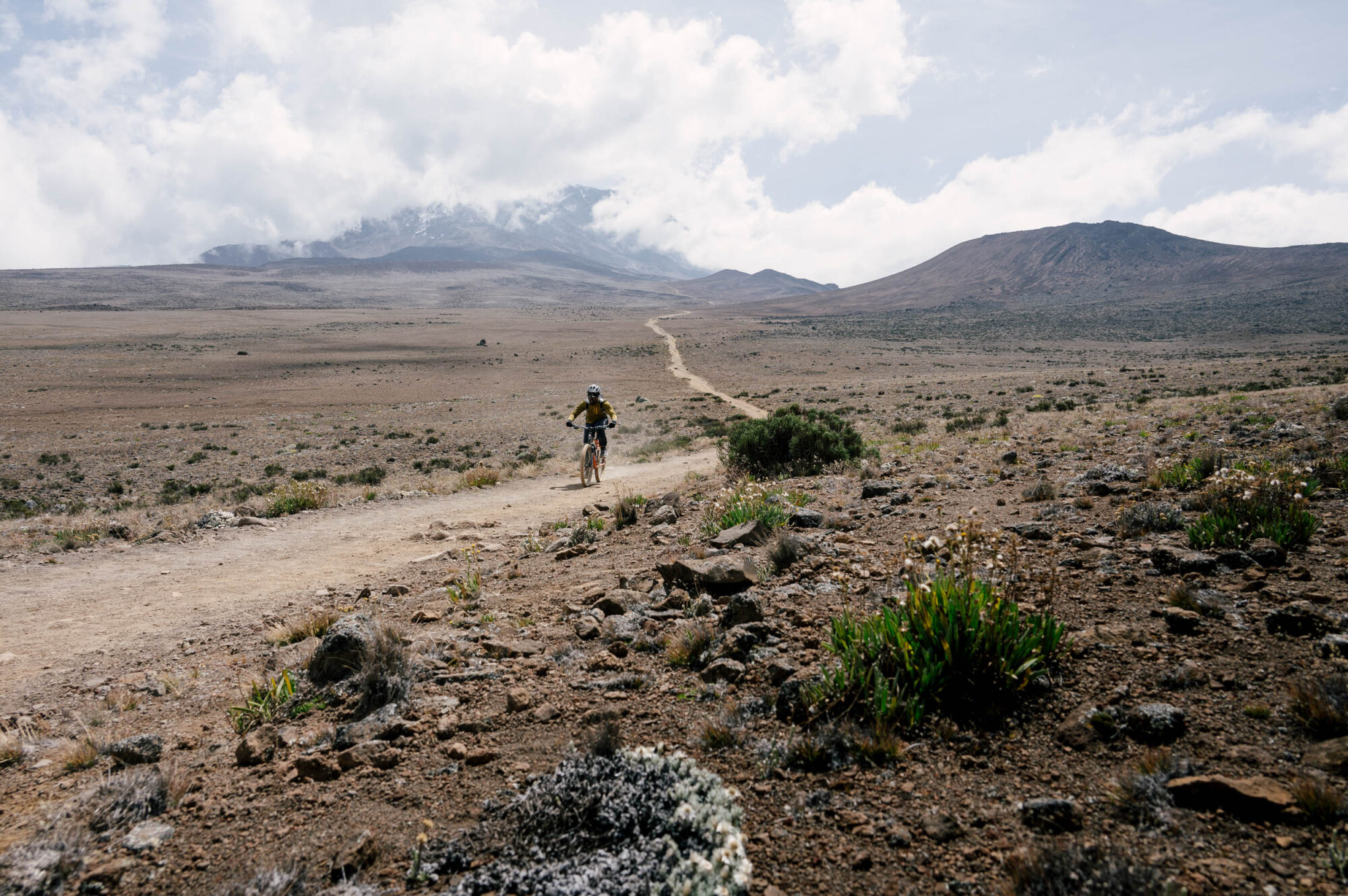
The wind picks up as the air gets thicker, and the tears are lapped from my eyes. I say goodbye to Africa. I say thank you for everything, for the highs and the lows, the best days and the worst. I will leave Africa with its highest peak in my bag. But more importantly, I will leave with a better understanding of the human condition. I will leave a more complete human. I will leave less confused about my place in the world. I will leave with several ugly scars and with many new friends. Victor and I descend a bit faster now, tucking into the corners, sprinting over the hills. Together, we ride. Together, we both go home.
Further Reading
Make sure to dig into these related articles for more info...
Please keep the conversation civil, constructive, and inclusive, or your comment will be removed.



